#like the internet was starting to enter the mainstream in a big way and She definitely was there for a lot of that early internet culture
Explore tagged Tumblr posts
Text
I like to think Miku took over the internet and world with nothing but Her pure charm, but VOCALOID came out at probably the perfect time. A few years earlier and there might not have been a sizeable internet audience to become enamored with Her. A few years later and She would have risked being rejected by the irony poisoning that was starting to take hold of the internet. Of course we'll never know and this is all very unsupported speculation, but it just makes perfect sense doesn't it? She showed up at the right time.
131 notes
·
View notes
Text
A Friend, Indeed (xoxo, Ari Ito✨ || The Sims 4: Get Famous)
CONTENT WARNING: Sexual themes, drug and alcohol use mentioned in this post and are intended for mature audiences. Reader discretion advised.
Ari's head was spinning. It was after 1AM by the time Ari walked out of the studio. The air was humid as it had just finished raining a few minutes ago. The city lit up; San Myshuno never sleeps.
Ari and Krishna worked to fine tune Ari's songs for her EP, titled Talk To Me, which had four songs. Track #4 features a local San Myshuno rapper and good friend of Ari's, Wade Sharpe (stage name: WADE). Ari re-recorded some vocals with Krishna, and together they created magic, making Ari's EP sound better than ever. Ari felt a moment of pride as they listened to the final tracks together. Ari shared the final tracks with WADE via FaceTime, and he was pumped for its release as well. This is ready, she thought. I'm ready.
By 11:45 PM, the EP was completed and ready to be released by the label, just in time for the surprise drop and tour announcement at midnight.
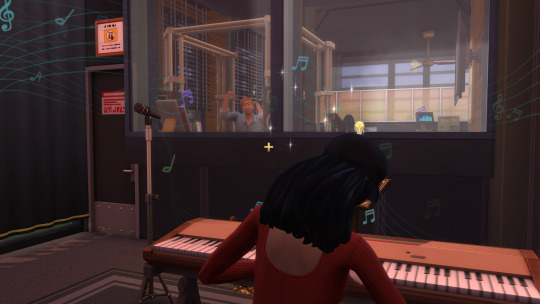
By 11:50 PM, Akira made his way over from his apartment to the studios with a bottle of champagne to celebrate.
"To Ari's current and future success, and to Talk To Me!" Akira raised his glass of champagne as a toast, and everyone followed suit, cheering as the clock stuck midnight, and all scheduled posts were sent out into the world. Ari just shared 4 new songs to the world, one of which she had written years ago in her song diary as a teenager. A song that was her baby, now out for everyone to hear. And to perceive. The feeling of dread hit Ari briefly before dissipating because now? Well, now, she's going on tour. What a dream.
Ding. Ding. Ding ding. dingdingdingdingdingdin-
10 new followers. 80 new followers. 750 new followers.
hunterhuntsley, and 3.9k others followed you.
hunterhuntsley tagged you and 3 others in a post.
hunterhuntsley, WADE, and 30,348 people liked your post.
dreamerdirk followed you.
By 12:05 AM, Ari was trending all over mainstream media. She was gaining hundreds of likes, comments, and followers every minute. Other celebrities were reaching out, following, praising Ari's music. Hunter's fans were flooding Ari's social media with praise and speculations about the collab between her and their favorite artist.
"Oh, we're making waves now, baby!" A very drunk Krishna passed around high fives throughout the room.
By 12:15 AM, the internet managed to dissect, criticize, and worship Ari's life, music, personality, and body. According to tabloids, "Ari Ito and Hunter Huntsley: Power Pop Couple™" have been secretly dating for months and that's why Ari gets to open for him on tour. Who even is she? Other "news" sources shame Ari for touring with the "Playboy of San My." Doesn't she respect herself at all? It's sad.
By 12:20 AM, Ari's EP was trending alongside Hunter Huntsley's album and tour. Ari was up to 210k followers on simstagram. The comments on her posts ranged from entirely supportive to downright hateful.
"You should stop reading about yourself online, it never helps." Akira was shuffling out of his shoes as he and Ari entered his apartment, located conveniently across the street from Dinky Beats Studios. The rest of the crew went their separate ways for the night, giving Ari and Akira some time to hang before Ari's flight back home to Oasis Springs later this afternoon. "It's hardly good for your mental health."
"I'm not reading about myself." Ari crossed her arms in defense, much to Akira's amusement. He smirked, rolling his eyes as he emptied his pockets into the tray by the door. "Akira, this is a really big deal. I've been wanting to release an album for a long time. I mean, yeah, it's just an EP, but it's a start. And now I'm about to open for a celebrity, like an actual, real touring celebrity! And so many people are saying so many things, and it's crazy. Dirk Dreamer followed me, by the way!" Ari placed a hand on her forehead, trying to process. Her mind was moving as fast as the popups on her phone. "I feel like I should be a lot more pumped than I am right now. Right now I'm just...overwhelmed. I was happier earlier today in the studio, but now?"
Akira placed his hands on Ari's shoulders. "I know. That's your body telling you that you need to step away for a bit and come back to it later. Come on." Akira dropped his arms and pulled his phone of out of his jacket pocket. He turned it off and placed it on the end table by the door. He reached out his hand to Ari. "Hand it here. I have a some joints with our names on 'em, and some cool albums to show you. Check your socials later once you digest all the stuff that's already happened. For now, let's shed the phones and enjoy the moment. Because, you're right. This is a huge deal. And you deserve to be here in this moment."
Ari took another look at her phone, now on silent. The notifications have been raining in for the last half hour, and they weren't slowing down. Ari wasn't convinced she could even use her phone without it crashing right now anyway. She surrendered the phone to Akira. He placed it beside his.
"Okay," Ari sighed, "but I need to wash this day off of me. Also, can you make me a margarita? I need to get festive."
Akira laughed, heading towards the kitchen bar, turning on various lights along the way. Ari watched in amusement as he pulled two margarita glasses from the bar, gathering the ingredients for the drinks. Akira methodically poured and garnished both drinks, much to Ari's delight.
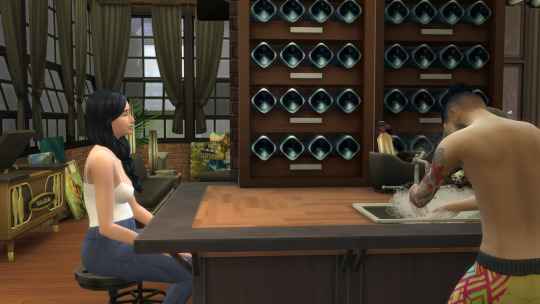
"Whoa, Chef A! You, sir, are going to make a lady very happy someday." Ari internally kicked herself when she realized what she said, overanalyzing how it sounded. She laughed weakly, hitting the joint, her gaze shifting to the ground. This amused Akira, smirking as he poured their drinks.
"So I've been told." Akira winks, placing Ari's drink in front of her as he strategically swiped the joint from her mouth.
"Hey!"
He was already laughing from the other room. "Have a nice shower!"
Ari rolled her eyes playfully before taking a sip of her margarita. Damn, this is delicious. Some shuffling around could be heard from the living room and then sounds of record scratching. Selena Quintanilla's voice soon filled the rooms. Ari smiled before throwing back the rest of her margarita, making a mental note to always have margaritas made by Akira, because god was that truly one of the best drinks she's ever had. Ari noticed earlier that Akira had an insane amount of vinyls and CDs scattered around his apartment in organized mountains (organized by genre and year, according to Akira), so it was no surprise that he would also have Selena on vinyl. Coincidence? Probably not. It was public knowledge that she grew up listening to Selena. Still, Ari thought the gesture was sweet.
Ari was able to make her way to the guest room where she slept the previous night after initially coming to visit. The bathroom was luxurious, with stone floors and a large soaking tub. Ari was able to briefly enjoy the shower yesterday morning before heading into the studio, and it was heaven. Ari decided to take a bath this time, and began to run the water. As she soaked, she was trying (and failing) to ignore the probable near-thousands of notifications that were on her phone right now. Also, Dirk Dreamer follows her!
A knock at the door snapped Ari out of her thoughts. "I made more drinks!" Akira's voice chimed in from the other side of the door. "They're in the fridge when you get out."
Ari smiled devilishly, feeling a lot more confident thanks to that last drink. "That sounds perfect. Think you could bring it to me now?"
Silence. Ari bit back a smile, imagining Akira's bewilderment.
"Er, uh...you want me to come in?" Ari was having more fun than she wanted to admit flirting with Akira.
"Yeah? I'm out of my drink, and I'd rather not get out the bath to get another one."
"So...you're in the bath." Akira said this as more of a statement and less of a question.
"Yes."
"And you want me to come in."
"Yeah." Ari listened with a satisfied grin as Akira walked to the kitchen to pour another drink and walk back to the bathroom door. She batted her lashes at Akira as he opened the door slowly. His eyes flashed with desire briefly before composing himself, handing her the drink. Ari chuckled, reaching out for the drink, exposing her breasts, relishing the attention. "You can join me if you'd like, Akira. I'd like that a lot, actually."
Turns out, Akira was more than happy to join her.
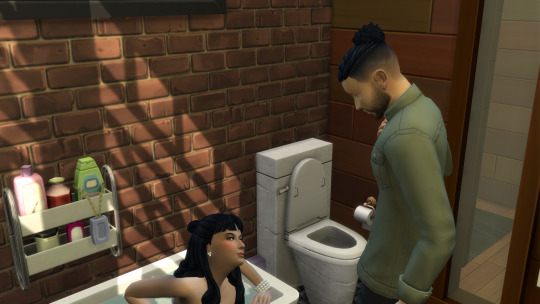

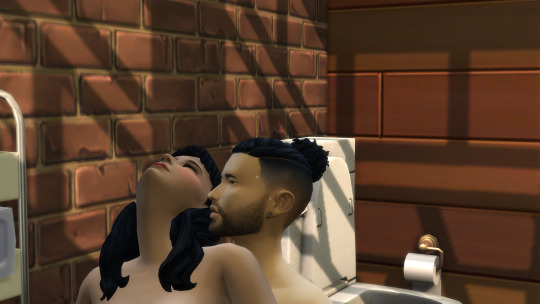
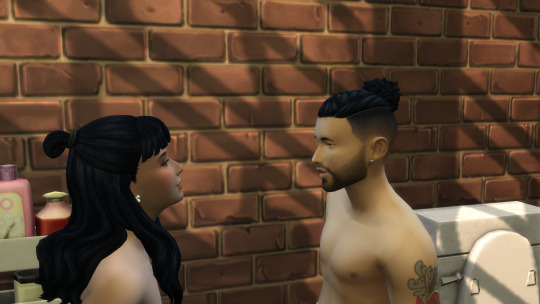
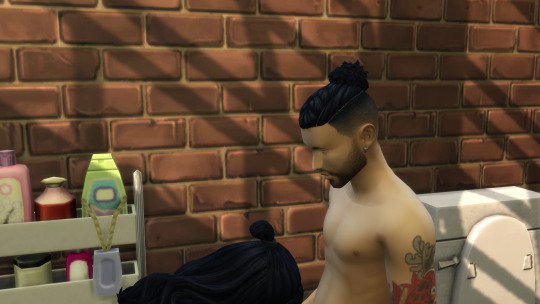


------------------------------------------------------------------------------
Ari and Akira sat on the couch with their own joints. It was after 5AM, according to Akira's wall clock. The sun began to make its appearance in the sky. Ari and Akira's phones were still by the front door. Ari spent the last few hours listening to albums with Akira and discovering just how incredibly skilled he was in bed. And on couches. And countertops.
Ari exhaled, breaking the silence they shared. Ari appreciated that she could sit in silence with Akira and be comfortable. "Did you already have Selena on vinyl," she asked over the music, "or did you go out and buy it after reading my article?" Akira laughed at Ari's jest mid-inhale, causing him to cough. Ari chuckled.
"Actually, no," Akira responded once his coughing fit subsided. He drank some water. "I already had the vinyl, thank you very much. My dad and I collect vinyls and CDs. Sometimes we trade back and forth, trying to get each other into new and old music, ya know? Kind of like what I'm doing with you right now," he laughs.
"Selena was in a stash of vinyls he mailed to me a while back. It's actually one of my favorites, so I kept it. She was incredible."
"Yeah, she was."
The two sat in silence again for a while, staring at the cloudy sky through the large glass windows. The morning breeze was blowing through the loft, making the air cold. Ari shivered.
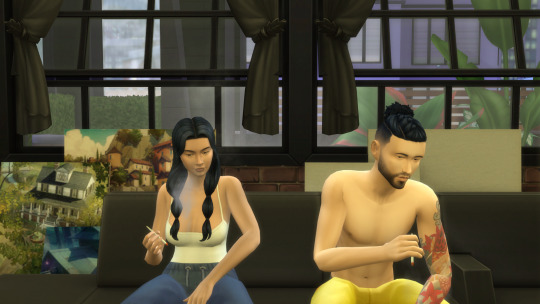
"Are you scared at all?"
It was Akira who broke the silence this time.
"Scared of what? Going on tour?"
"Well, yeah, I guess. I mean...fame in general. I mean, look at what happened to Selena." For a moment after saying those words, the air felt still, despite the breeze. Ari frowned.
"I just want to share my art," she admitted after a moment. "I want a fun way to express what I do. There's a risk in everything, I guess. I don't worry about that so much as I worry about losing myself. I don't wanna do that. I don't want to have to change for anybody, but I don't want to let anybody down."
Akira shifted his gaze from the floor to Ari. She continued to stare at the floor.
"You won't," he murmured, studying her face.
Even with her face bunched from worry, Ari was still the most beautiful woman Akira had ever seen. He was mesmerized by the way her silky black hair framed her face. Her eyes seemed to always twinkle. Her lips were perfectly pouted. Akira felt connected to Ari. The attraction was driving him crazy. Physical aspects aside, Ari was a really cool person to know. She was funny, confident, sexy, and smart. Her personality was electrifying. Her knowledge of music, expansive. Akira realized that Ari was someone you pull an all-nighter with listening to records in your penthouse apartment. He hasn't had that with anybody in a long time. Not since her...
Akira shook his head quickly, dispelling the thoughts before they had a chance to run wild. He took Ari's hand. She gasped lightly, getting caught by surprise. Ari was lost in her own thoughts, too.
"Ari, I hope you know that no one is more deserving of this than you." Her eyes twinkled. "You deserve this recognition, and you deserve to be celebrated." Akira leaned into Ari, using the tip of his nose to trace circles on Ari's neck as he spoke. "And I personally really enjoy celebrating with you and wouldn't mind doing it again." Ari shivered, going mad.
"Don't you think we've celebrated enough for one night?" Ari laughed shakily. Her laughs turned into sighs turned into moans as Akira's hand began to roam.
"I could celebrate with you over and over and over, but that's just me," Akira murmured, causing Ari to shiver again. Ari couldn't see his face, but she could feel him smile as he teased her.
"You've made a lady very happy today, by the way." Ari sighs, leaning in to Akira's gentle touches.
#sims4nsfw#sims 4#sims 4 gameplay#the sims 4#simblr#sims 4 screenshots#sims community#sims4#the sims#thesims4#ts4#thesims4cc#the sims4#the sims community#the sims cc#sims#sims4 stories#sims 4 cc#sims 4 custom content#sims 4 community#sims 4 legacy#sims 4 story#sims 4 storytelling#sims 4 simblr#sims 4 poses#showusyourgameplay#show us your sims#show us your story#simstory#akira kibo
0 notes
Photo
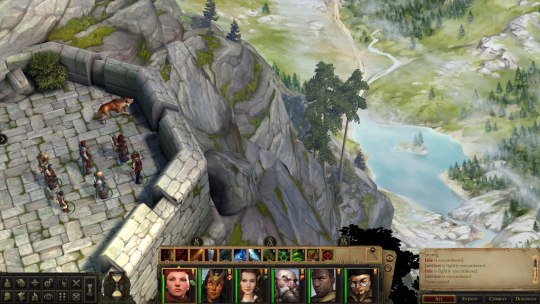
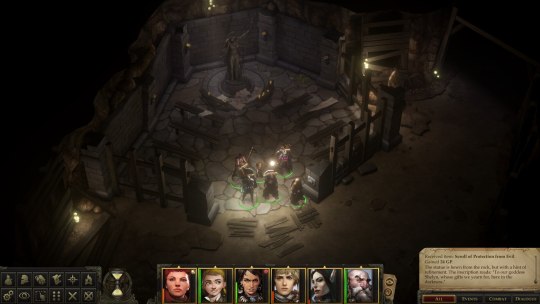
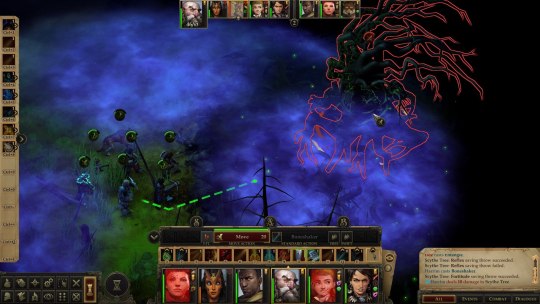
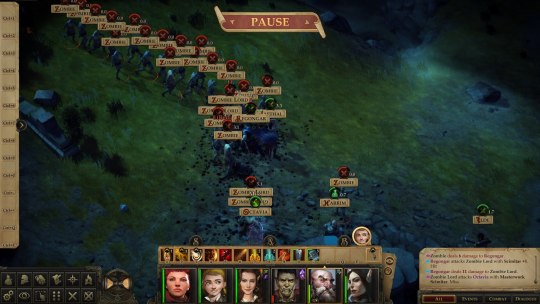
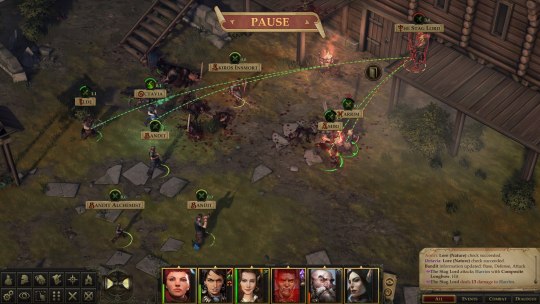
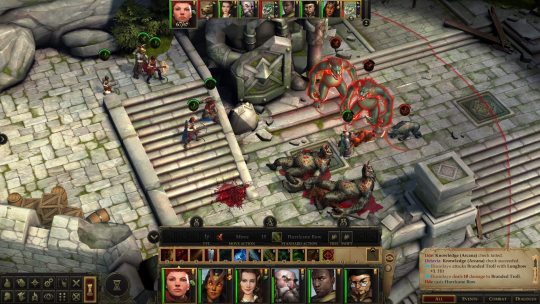
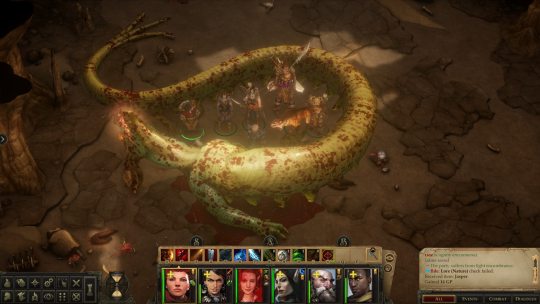
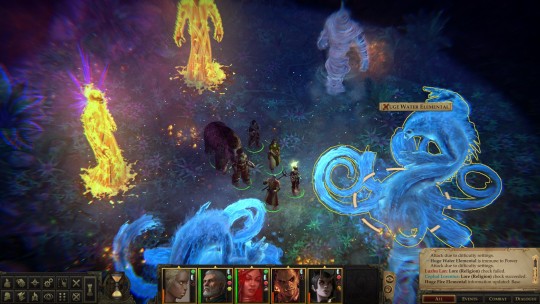
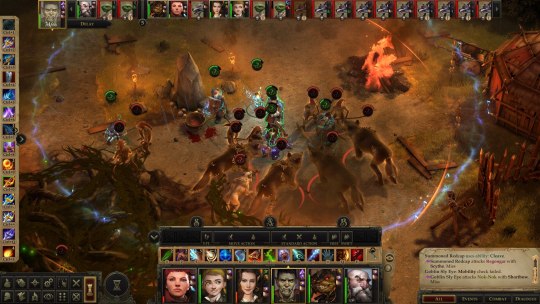
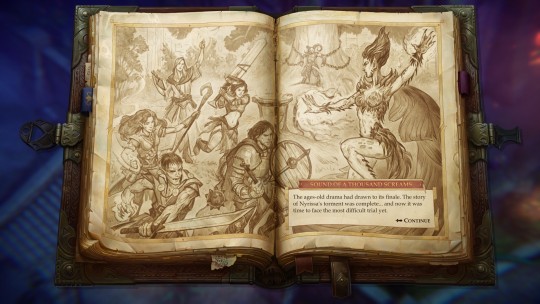
The long process of making a king
I have like, no time for long video games anymore. My days of being able to play The Witcher 3 for ten hours straight are gone, and most of the time I’m lucky if I can get an hour or two at night. Enter Pathfinder: Kingmaker, a particularly long game which took me almost two years to finish. I started it in June 2020, back when the pandemic was still relatively new, and I finally finished it in April of 2022, after months of just playing here and there in the evenings and whenever I had some alone time on weekends. Oh, I took some long breaks as well, to play stuff like Cyberpunk 2077 and Resident Evil Village, which is probably why this game became an unusual constant in my life.
For a game that I played for nearly 24 months, Pathfinder: Kingmaker is sort of a mess. It’s an adaptation of the Kingmaker Adventure Path of the Pathfinder tabletop roleplaying game, which is a very nifty sandbox campaign where your ragged band of heroes free a region called the Stolen Lands from a bandit lord, become monarchs, and deal with all the business of setting up a new kingdom in a fantasy world - invasions of violent trolls, sabotage at the hands of a rival king and an angry fey lady who wants the world to burn. There’s possibly an argument of “Hrmm, this campaign kinda sounds like the player characters are doing some light colonization,” but since the plot takes pains to present the Stolen Lands as constantly suffering under the control of bad guys who are going to abuse the populace in your absence, I’ll avoid giving myself a headache by looking too close. Kingmaker’s a grand enough campaign that I decided to bank the Pathfinder 2e crowdfunded conversion, which was supposed to come out in 2020 but got hit with a ton of Slow spells and will hopefully release this year.
But we’re not talking about tabletop stuff here, we’re talking about the video game made by smallish Russian developer Owlcat Games. Kingmaker was released in 2018 with a whole bundle of bugs, and even though most have been fixed by now, the game’s still kinda fiddly. The encounters feel like they were designed by min/maxers with the computer straight up seeming to cheat the farther you get, and there’s a ton of stuff that the game just doesn’t bother to explain to you, ranging from the intricacies of the Pathfinder 1e ruleset to the unexplained methods of romancing your comrades - some of which barely seem to have any internet info on them, three and a half years after release. Oh yeah, and I only somewhat understood the whole kingdom management system, which is a funny thing to make perplexing especially in a game named, err, Kingmaker.
For all these reasons, I don’t know if I can recommend Kingmaker to anyone who hasn’t played a computer RPG before, or D&D/Pathfinder on a table. It certainly doesn’t have the same sort of mainstream appeal as the Divinity: Original Sin games - but honestly, I like Kingmaker a lot more despite its messiness. The fact that I’m a fan of the Pathfinder setting certainly helps, but there’s a sort of enjoyable Eastern European jank that shows up a lot in computer RPGs which always feels like, “a small studio bit off way more than they could chew with this monster of a game, but they committed to releasing it, the mad lads.” I felt that way with The Witcher 1, for instance, and I feel that way with Kingmaker. Despite its annoyingly designed encounters and obfuscating mysteries, the game radiates quite a lot of charm and re-creates the modules it was based on with staggering accuracy. Owlcat also improved Nyrissa, originally the big villain of tabletop Kingmaker, by injecting her with way more personality than she ever had in the original campaign. They even listened to fan response throughout Kingmaker’s life, and when the people demanded a turn-based combat mode, they got the blessing of the dude behind a popular mod and stuck it in the game itself. Good form.
I also found Kingmaker interesting because it marks the longest time I’ve spent with the Pathfinder 1e ruleset. I GM the second edition of the game every other week, but I’ve never actually played or run its predecessor or the D&D 3e/3.5e rules it was based on. I got my start with tabletop games relatively recently, in 2017 with D&D 5e, and even though I read the Pathfinder 1e books and hacked together versions of their systems for my D&D games, diving into Kingmaker was the first time I got to truly see the system for what it is. And man, that Pathfinder 1e ruleset is a beast, forever making me alternate between thinking “huzzah there’s SO MUCH crap here” and “oh GOD there is so much crap here.” Let it be said that on some of those nights when I only had two hours to play this darn game, I spent an hour and a half of that time just leveling up my characters. Also, I will never miss Arcane Spell Failure.
At the end of the day, if I’d played or GMed Kingmaker when it came out as a tabletop adventure, it probably would’ve taken two years of real life to complete. In that sense, this game was hellacious accurate. Play it if you can tolerate overcomplicated systems or like min/maxing. If that’s not your style, just play it on Easy mode and install the Bag of Tricks mod, which lets you do everything from instantly teleporting your party across the screen to romancing characters you might’ve pissed off. Or check out Wrath of the Righteous instead, Owlcat’s other adaptation of a Pathfinder Adventure Path which seems to fix most of the problems of their first effort. I’m gonna start that one soon; if all goes well I should finish it in 2024. Yippee.
8 notes
·
View notes
Text
so I started adderall and hoo boy. lemme tell you. what a wild feeling, in so many ways, but especially right now where I’m like “I’m not doing anything shouldn’t I be panicking” and my brain is like “no. you have a lot to do. but you’ve also been working really hard. so it’s okay to take a break for a few minutes” and I BELIEVE MYSELF??
WOW
anyway here’s some stuff under the cut about it because I can’t believe how well this is working out.
background: I’m hypoglycemic. one big reason I decided to do this was, I was having this issue where I get depressed if I don’t eat sugar. I was eating sugar to feel joy. I am at risk for diabetes but even if I wasn’t this is not...great. I’ve always had to watch my blood sugar and I’ve always been careful about what I eat but in recent years, the amount of actual dessert/candy I eat has gotten mildly out of control and my doctors have told me to watch my sugar and I just...wasn’t able to.
one of my coworkers who is also not-neurotypical and as such knows her shit, told me that this whole “sugar to feel joy” thing is an ADHD symptom. I knew I had ADHD (I’d been diagnosed in high school) but wasn’t being treated for it, but had never been told this was a symptom, and at that point I was like, you know what, fuck this, I can’t get my health under control on my own if I’m not being treated for my mental health as well. I’m talking to my psychiatrist about this.
so I did. enter adderall. and now I wanna talk about it because it’s been FASCINATING and I am all about brain medication when you need it. so here goes!
also I live-tweeted my first 24 hours on adderall because it was SO WILD and I’m so glad I did even though I have three (3) followers, more on that in a minute
(me: I can’t tell if it’s working, it’s supposed to kick in in 30 minutes but--wait I think my brain just went bOOP
coworker: is bOOP good?
me: it’s WEIRD)
the good
Y’ALL THE SUGAR THING WORKED IMMEDIATELY. oh my god I was stunned. absolutely stunned. I still absolutely have a sweet tooth and enjoy eating sweets but I can eat a normal amount, at normal times, and not because I need to feel something. it’s because I want to eat something sweet. I can’t believe in 24 hours I went from complete inability to control myself to just...not having to. brains!! who knew!!!
I focused on an entire conversation the entire time. the entire time. I was even very stressed because my blood sugar was low and I needed to eat, but I was able to put that aside because I knew I could deal with it when the conversation was over! WHAT THE HELL!
since then it hasn’t been that easy because conversations are, quite frankly, often very boring, especially for work. but it’s easier to focus when I need to, and not zone out halfway through or have to do something else in order to focus. or start stressing/thinking about other shit that doesn’t matter. I can listen to what people are saying!!! for an hour! it’s crazy!!!
I wasn’t tired all day! this is also part of the bad. you’ll see.
I feel more in control of my days now, and less like time is speeding by at a rate I don’t and can’t comprehend. I’ve gotten fairly good at planning out and prioritizing my time anyway, but now it’s like...better. and easier.
executive function is online, and as I alluded to, no more self-guilt-tripping if it takes me a minute to get to things. they’ll still get done! it’s okay! if I don’t do something right away I will still do the thing! I have years of experience parceling tasks into small pieces so I do them, but less so with not still getting on my own case about not doing them right away.
if I don’t have music or a podcast playing at all times, I can still focus on work. it’s still pretty nice, it’s just not absolutely necessary. this is throwing me off hardcore but it’s kind of nice to be able to be in silence occasionally.
I can still multitask but if I’m NOT multitasking I don’t feel like I’m going insane, and also, I don’t feel like my brain is hanging by a thread at all times that might break and cause everything to explode.
a tweet I made: “I was researching something and when I got frustrated I kept at it and didn't have to go take a break to do something equally frustrating and pinball back and forth between them until they both got done. I might have just been weaponized? “
it’s true. researching/looking stuff up is one of my skillsets and...I’ve been weaponized.
the bad
my appetite is allll fucked up. we’re adjusting the type of medication I’m on to try and mitigate this but wow it’s an appetite suppressant and wow that’s not okay when you’re hypoglycemic and have to keep your blood sugar up.
my sleep is also fucked up. anxiety keeps me from falling asleep and I’d gotten to a good place re: falling asleep at night. however I was also in a very bad place re: sleeping constantly (sleep apnea? quarantine depression? who knows!). but waking up constantly during the night ain’t the solution, chief. so we’re also adjusting to see if we can do something about that.
regarding that: the first night, I literally just did not get tired. it was very upsetting. if I hadn’t tweeted about it I would’ve had an out and out panic attack, but one of my friends talked me off the ledge, telling me she had the same experience when she first went on it. I was not warned and I wish I had been. I was still able to sleep (she wasn’t, when it happened to her) but hoo boy. no thank you.
pharmacies like to babysit you when you’re on controlled substances. ugh.
more shit to keep track of. ughhhhhhhhhhhh
unfortunately, I had a hard time finding mainstream resources for this stuff online. I’ve read a lot from tumblr and heard from other people’s experiences, but when I went looking for, say, information on adderall & sleep...a lot of it is related to addiction. I had a similar problem with ADHD & sleep: I wanted to know more about whether ADHD can make you really tired like I was, or whether it was just an insomnia type of thing, and there just wasn’t a lot out there. this isn’t really a problem with the drug, but like...it’s a pain when you really want to learn more about something, aren’t in a place to talk to your doctor yet, and are just left to the wind with the mainstream internet assuming you’re abusing a substance.
definitely also felt like I had to lay the groundwork with my doctor...I had been planning to talk to her about this for a while, so I mentioned my ADHD diagnosis early on so I could bring it up at some point and not just out of the blue ask her for meth. this stuff is hard.
(not making a statement of any kind of recreational drug use/addiction, just...I hate the US medical system. a lot. everybody loses.)
so that’s how it’s going! sorry for the long post, but I did want to document this somewhere besides twitter, and maybe some of y’all are interested.
oh also, my other favorite thing that happened is my doctor said to try to keep track of when I take the medication and it wears off, and I literally told her that that would also be a good marker of whether or not it’s doing its job, because in my natural state I literally cannot remember to do that, with anything, ever. and I did! I managed! WILD
anyway end the stigma. ♥️
9 notes
·
View notes
Text
Did Republicans Riot After Obama Was Elected
New Post has been published on https://www.patriotsnet.com/did-republicans-riot-after-obama-was-elected/
Did Republicans Riot After Obama Was Elected

Undocumented Kids Are Saved By Obamas Executive Order Daca Which Would Put A Halt To Deportation For Those Whod Entered The Country Before Age 16 And Yet In A Bid To Get The Gop To Come Over To His Side On Immigration Reform The President Has Also Deported A Record 15 Million People In His First Term
A Family Caught in Immigration Limbo
When Belsy Garcia saw her mother’s number appear on her iPhone on the afternoon of June 15, she felt what she calls the “uncomfortable fluttering” sensation in her chest. She knew that daytime calls signaled an emergency. The worst one had come the previous year, when her sister told her ICE agents had placed their father in federal custody.
Garcia was attending Mercer University in Macon, Georgia, when her father was marched out of her childhood home. As an undocumented immigrant — like both of her parents, who are from Guatemala — she couldn’t qualify for loans. She financed her education through scholarships and a stipend she earned as a residential assistant. Now she wondered if her mother was calling to say her father had been deported, which might force her to leave school to become the family’s breadwinner.
But this call was different. “Go turn on the television,” Garcia’s mother said. “You’re going to be able to work, get a driver’s license.”
Onscreen, President Obama was announcing the Deferred Action for Childhood Arrivals program. Undocumented immigrants who had arrived in the United States as children could apply for Social Security numbers and work permits. Garcia qualified: Her parents had brought her to this country when she was 7 years old. DACA transformed her into a premed student who could actually become a doctor. “It was like this weight was lifted,” she says. “All of that hard work was going to pay off.”
In The Next Hundred Days Our Bipartisan Outreach Will Be So Successful That Even John Boehner Will Consider Becoming A Democrat After All We Have A Lot In Common He Is A Person Of Color Although Not A Color That Appears In The Natural World Whats Up John Barack Obama White House Correspondents Dinner
And Then There Were Three
The first woman to argue a case before the Supreme Court did so in 1880. It would take another 101 years for a woman to sit on that bench rather than stand before it. Even then, progress was fitful. Over the 12 years that Sandra Day O’Connor and Ruth Bader Ginsburg served together, their identities evidently merged; lawyers regularly addressed Ginsburg as “Justice O’Connor.” When O’Connor retired in 2006, she left the faux Justice O’Connor feeling lonely. Ruth Bader Ginsburg warned of something far more alarming: What the public saw on entering the court were “eight men of a certain size, and then this little woman sitting to the side.” They might well represent the most eminent legal minds in America. But there was something antiquated, practically mutton-choppy, about that portrait.
How many female justices would be sufficient? Nine, says Justice Ginsburg, noting that no one ever raised an eyebrow at the idea of nine men.
Seal Team Six Kills Osama Bin Ladenraiding His Secret Compound In Abbottabad Pakistan While Obama And His Top Advisers Watch A Live Feed Of The Mission From The White House Situation Room The Picture Of The Assembled Becomes The Last Supper Of The Obama Era
Poop Feminism
For me, it’s one moment. All the bridesmaids have come to the fancy bridal shop to see Maya Rudolph try on wedding dresses. This should be a familiar scene: The bride emerges from the changing room and … This is the dress! The friends clap. The mother cries. Everyone is a princess. Go ahead and twirl!
But when the bride emerges in Bridesmaids, almost all of her friends have started to feel sick. Sweat coats their skin. Red splotches creep over their faces. They try to “ooh” and “aah,” but it’s already too late. It starts with a gag from Melissa McCarthy, followed by another gag. Then a gag that comes simultaneously with a tiny wet fart. It’s the smallness of the fart that’s important here. It’s the kind of fart that slips out — a fart that could be excused away, a brief, incongruous accident. Women don’t fart in wedding movies, and women certainly don’t fart at the exact moment that the bride comes out in her dress. This can’t be happening. Melissa McCarthy blames the fart on the tightness of her dress. We breathe a sigh of relief.
Then sweet Ellie Kemper gags, and the sound effect is surprisingly nasty. Ellie’s face is gray. Melissa’s face is red. They look bad. They are embarrassed. How far is this going to go?
The camera cuts. We are above now. We look down from a safe perch as the release we have been anticipating and dreading begins. It is horribly, earth-shatteringly gross. A woman has just pooped in a sink. The revolution has begun.
The Government Acquires A 61 Percent Stake In Gm And Loans The Company $50 Billion The Auto Bailout Will Eventually Be Heralded As A Great Success Adding More Than 250000 Manufacturing Jobs To The Economy
The Auto Industry Gets Rerouted
“The president was very clear with us that he only wanted to do stuff that would fundamentally change the way they did business. And that’s what we did. There were enormous changes. For example, General Motors had something like 300 different job classifications that the union had. If you were assigned to put the windshield wipers on, you couldn’t put tires on. And we wiped all that stuff out. We basically gave back management the freedom to manage, to hire, to fire. People stopped getting paid even when they were on layoff. We reduced the number of car plants so that there wasn’t so much overcapacity. So now, when you have 16 million cars sold , they’re making a fortune.”
Black Lives Matter Activists Are Arrested In Baton Rouge Louisianaprotesting The Murder Of Alton Sterling; More Than 100 People Are Detained In St Paul Minnesota Protesting The Murder Of Philando Castile


What Is the Point of a Quantified Self?
Melissa Dahl: The Fitbit was introduced at a tech conference eight years ago. It’s kind of incredible to realize that, before then, this idea of the “quantified self” didn’t really exist in the mainstream.
Jesse Singal: I feel like it’s the intersection of all these different trends: Everyone plays video games these days. You got smartphones everywhere. And people are realizing that solutions to the big problems that lead to sleeplessness and anxiety and bad eating — unemployment and income inequality and yada yada yada — aren’t gonna get solved anytime soon.
MD: That’s interesting, because all of this self-tracking is also, according to some physicians, giving people more anxiety! A Fitbit-induced stress vortex.
Cari Romm: It feels like productive stress, though. I’m talking as a recovered Fitbit obsessive, but it does make you look at Fitbit-less people like, “You mean you don’t care how many steps you took today?”
MD: Oh, God. I don’t care. Should I care? Sleep is the one thing I obsessed over for a while. Which does not really help one get to sleep.
JS: Do you think an actually good and not obsession-inducing sleep app could help, though?
MD: There’s some aspect to the tracking idea that really does work. I mean, it’s just a higher-tech version of a food journal or sleep journal, right? Ben Franklin 300 years ago was tracking his 13 “personal virtues” in his diary.
JS: Would Ben Franklin have been an insufferable tech-bro?
Officer Darren Wilson Fatally Shoots Michael Brownin The St Louis Suburb Of Ferguson Sparking A National Protest Movement And Setting Off Unrest That Will Remain Unresolved Two Years Later
On the Triumph of Black Culture in the Age of Police Shootings
In the two years since Mike Brown was fatally shot by the police in Ferguson, and the video footage of his dead body in the street went viral, we have seen the emergence of a perverse dichotomy on our screens and in our public discourse: irrefutable evidence of grotesquely persistent racism, and irrefutable evidence of increasing black cultural and political power. This paradox is not entirely new, of course — America was built on a narrative of white supremacy, and black Americans have simultaneously continued to make vast and essential contributions to the country’s prominence—but it has become especially pronounced. And it’s not just because of the internet and social media, or the leftward shift of the culture, or black America’s being sick and tired of being sick and tired. In fact, it is all of these things, not least two terms with a black president. In the same way that black skin signals danger to the police , his black skin, to black people, signaled black cultural preservation. African-Americans didn’t see a black man as the most powerful leader in the free world; we saw the most powerful leader in the free world as black. This is what comedian Larry Wilmore was expressing at the 2016 White House Correspondents’ Dinner when he said, “Yo, Barry, you did it, my nigga.” It was a moment of unadulterated black pride.
Militants Attack American Compounds In Benghazi Libya Killing Us Ambassador Chris Stevens And Three Other Americans There Will Eventually Be Eight Congressional Probes Into The Incident
“I Know I Let Everybody Down”
“Before the debate, David Plouffe and I went in to talk to him and give him a pep talk and he said, ‘Let’s just get this over with and get out of here,’ which is not what you want to hear from your candidate right before the debate. We knew within ten minutes that it was going to be a debacle. We had armed him with a joke — it was his 20th anniversary, and he addressed Michelle — and it turns out Romney was expecting just such a line and had a really great comeback. And Romney was excellent — just free and easy and clearly well prepared and showed personality that people hadn’t seen before. Obama looked like he was at a press conference.
We had a meeting at the White House and he said, ‘I know I let everybody down and that’s on me, and I’m not going to let that happen again,’ and that was his attitude. We always had debate camps before, where we’d re-create in hotel ballrooms what the set would look like, and all of the conditions of the real debate. When we went down to Williamsburg, Virginia, for the next debate camp, he seemed really eager to engage in the prep. We had a decent first night. That was on Saturday. On Sunday night, Kerry, playing Romney, got a little more aggressive and Obama a little less so; it looked very much like what we had seen in Denver. It was like he’d taken a step back.
Scott Brown Is Elected Massachusetts Senatorturning Ted Kennedys Seat Republican For The First Time Since 1952 And Suddenly Throwing The Prospect Of Passing Obamacare Into Jeopardy
Plan B
“I’m talking to Rahm and Jim Messina and saying, ‘Okay, explain to me how this happened.’ It was at that point that I learned that our candidate, Martha Coakley, had asked rhetorically, ‘What should I do, stand in front of Fenway and shake hands with voters?’ And we figured that wasn’t a good bellwether of how things might go.
This might have been a day or two before the election, but the point is: There is no doubt that we did not stay on top of that the way we needed to. This underscored a failing in my first year, which was the sort of perverse faith in good policy leading to good politics. I’ll cut myself some slack — we had a lot to do, and every day we were thinking, Are the banks going to collapse? Is the auto industry going to collapse? Will layoffs accelerate? We just didn’t pay a lot of attention to politics that first year, and the loss in Massachusetts reminded me of what any good president or elected official needs to understand: You’ve got to pay attention to public opinion, and you have to be able to communicate your ideas. But it happened, and the question then was, ‘What’s next?’
Sheryl Sandbergs Lean In Hits Bookstores Making The Feminist Case That Women Should Be More Aggressive And Ambitious In Their Careers And Making Feminists Themselves Very Angry
The “Mommy Wars” Finally Flame Out
After decades of chilly backlash, we find ourselves, these past eight years, in an age of feminist resurgence, with feminist websites and publications and filmmakers and T-shirts and pop singers and male celebrities and best-selling authors and women’s soccer teams. Of course, as in every feminist golden age, there has also been dissent: furious clashes over the direction and quality of the discourse, especially as the movement has become increasingly trendy, shiny, and celebrity-backed.
Perhaps the most public feminist conflagration of the Obama years came at the nexus of policy and celebrity, of politics and pop power. It was the furor over Facebook COO Sheryl Sandberg, who gave a viral 2010 TED Talk about women in the workplace who “leave before they leave” — who alter their professional strategy to accommodate a future they assume will be compromised by parenthood — which led to the publication of her 2013 feminist business manifesto, Lean In.
It’s a lesson of the Obama era: One approach to redressing inequality does not have to blot out the others. Sometimes, attacking from all angles is the most effective strategy.
Texas State Senator Wendy Davis Laces Up Her Pink Running Shoes And Spends Ten Long Hours Attempting To Filibuster A Billthat Wouldve Imposed Statewide Abortion Restrictions
“The Concept of Dignity Really Matters”
“I was given an enormous degree of latitude. I did communicate with the White House counsel on occasion about high-profile cases, but it was much more in the nature of just giving them a heads-up, to calm any nervous feelings they might have. There’s only one exception to that, and it was on marriage equality, in the Hollingsworth v. Perry case in 2013. We were contemplating coming in and arguing that it was unconstitutional for California to refuse to recognize the legal validity of same-sex marriages. But we didn’t have to do it . And because it was a discretionary judgment, and it was such a consequential step, that was the one matter where I really sought out the president’s personal guidance. I wanted to make sure the president had a chance to thoroughly consider what we should do before we did it. It was really one of the high points of my tenure. It was a wide-ranging conversation about doctrinal analysis, about where society was now, about social change and whether it should go through the courts or through the majoritarian process, about the pace of social change, about the significance of the right at stake. He was incredibly impressive.
A Golf Summit Between John Boehner And Barack Obama Stirs Hopethat Perhaps The Two Parties Will Come To A Budget Agreement And Forestall A True Crisis Secret And Semi
A Grand Bargain That Wasn’t, Remembered Three Ways
“The president of the United States and the Speaker of the House, the two most powerful elected officials in Washington, decided in a conversation that they both had to try to make something happen. Maybe it would be the way it worked in a West Wing episode in a world that doesn’t work like a West Wing episode. That’s how it started — two individuals saying we’re going to try. I think they both shared a belief in the art of the possible, and they both did not think compromise was a dirty word.
When our cover was blown — a Wall Street Journal editorial came out saying that Boehner and Obama were working on this and attacking the whole premise — that was devastating. It resulted in Cantor being a part of the talks. Cantor and Boehner came in, and I think it was a weekend private session with the president in the Oval Office, and they were talking about the numbers. At one point Cantor said, ‘Listen, it’s not just the numbers. There’s concern that this will help you politically. Paul Ryan said if we do this deal, it will guarantee your reelection. If we agree with Barack Obama on spending and taxes, that takes away one of our big weapons.’ There were so many obstacles, some of them substantive — how much revenue, and what about the entitlements? — but there was also this overlay of ‘This is going to help Obama.’
Illustrations by Lauren Tamaki
The Obama Administration Unveils Its Plan For Regulating Wall Streetwhich Is Then Introduced In Congress By Senator Chris Dodd And Representative Barney Frank
MJ=JC?
Lane Brown: Michael Jackson’s death was a big deal for lots of obvious reasons, including the surprising way it happened and the fact that he was arguably the most famous person on the planet.
Nate Jones: He was an A-lister with an indisputable body of work; he was 50 years old, his hits were the right age — old enough that every generation knew them, but not too old that they weren’t relevant anymore.
LB: But it was also the first huge celebrity death to happen in the age of social media, or at least the age of Twitter.
NJ: MJ’s death came alongside the protests in Iran, which was when Twitter went mainstream.
LB: It also meant that so much of the instant reaction was to make it all about us.
Frank Guan: In a lot of ways, the culture prefers the death of artists to their continuing to live. Once an artist gets launched into the stratosphere, there’s no way to come down, and that permanence becomes monotonous. They run out of timely or groundbreaking material and the audience starts tuning out. At some point, their fame eclipses their art, and then the only way to get the general audience to appreciate them anew is for them to die.
LB: People seem to like the grieving process so much that even lesser celebrities get the same treatment.
Congresswoman Gabby Giffords Returns To The House Floor For The First Time Since Being Shot In A Massacre In January Casting A Vote In Favor Of The Debt

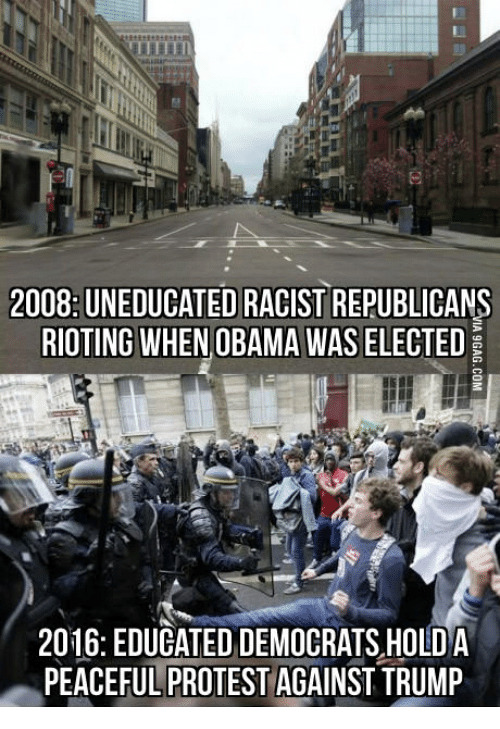
A Rare Moment of Unity
“I was doing intensive rehabilitation in Houston at the time but was following the debate closely, and I was pretty disappointed at what was happening in Washington. I’d seen the debate grow so bitter and divisive and so full of partisan rancor. And I was worried our country was hurtling toward a disastrous, self-inflicted economic crisis. That morning, when it became clear the vote was going to be close, my husband, Mark, and I knew we needed to get to Washington quickly. I went straight from my rehabilitation appointment to the airport, and Mark was at our house in Houston packing our bags so he could meet us at the plane.
That night, I remember seeing the Capitol for the first time since I was injured and feeling so grateful to be at work. I will never forget the reception I received on the floor of the House from my colleagues, both Republicans and Democrats. And then, like I had so many times before, I voted.
I worked so hard to get my speech back, and honestly, talking to people who share my determination helped me find my words again. I’ve been to Alaska, Maine, and everywhere in between. Best of all, I got back on my bike. Riding my bike once seemed like such a huge challenge. It seemed impossible.”
Miley Cyrus Twerks At The Mtv Vmassetting Off A Controversy About Cultural Appropriation That Soon Ensnares Seemingly Every White Pop Star On The Planet
• Karlie Kloss wears a Native American headdress and fringed bra at the Victoria’s Secret fashion show.
• Justin Timberlake is accused of appropriating black music when he tells a black critic “We are the same” after praising Jesse Williams’s BET Humanitarian Award speech about race and police brutality.
• DJ Khaled gets lost on Jet Ski, snaps the whole time.
• Two UW-Madison students snap their meet-cute as the entire student body cheers them on.
• Playboy Playmate Dani Mathers films and mocks an anonymous woman in the gym shower.
• A Massachusetts teen records the sexual assault of a 16-year-old girl. The video is later seen by a friend of the victim.
Prior To Going To War In Iraq Defense Secretary Donald Rumsfeld Optimistically Predicted The Iraq War Might Last Six Days Six Weeks I Doubt Six Months
What’s more, Vice-President Dick Cheney said we would be greeted as liberators by the Iraqi people after we overthrow Saddam.
They were both horribly wrong. Instead of six weeks or six months, the Iraq war lasted eight long and bloody years costing thousands of American lives. It led to an Iraqi civil war between the Sunnis and the Shiites that took hundreds of thousands of Iraqi lives. Many Iraqi militia groups were formed to fight against the U.S. forces that occupied Iraq. What’s more, Al Qaeda, which did not exist in Iraq before the war, used the turmoil in Iraq to establish a new foothold in that country.
The Iraq war was arguably the most tragic foreign policy blunder in US history.
In 2012 Republicans Predicted That Failure To Approve The Keystone Pipeline Would Send The Price Of Gasoline Sky High And Kill Large Numbers Of Jobs
Despite the fact that the Keystone Pipeline was not approved, the price of gasoline continued to drop below $1.80 per gallon, millions of new jobs were created and unemployment dropped from 8% to 4.9% by early 2016. The most optimistic predictions say that the Keystone Pipeline would only create a few dozen long-term jobs and would do nothing to lower the price of gasoline.
Eric Cantors Stunning Primary Loss Suggests No Politician Is Safe From The Rage Of The Tea Party Not Even The Tea Partys Canniest Political Leader
From Party’s Future to Also-Ran in a Single Day
On the day his political career died, Eric Cantor was busy tending to what he still believed was its bright future. While his GOP-primary opponent, David Brat, visited polling places in and around Richmond, Virginia, Cantor spent his morning 90 miles away at a Capitol Hill Starbucks. He was there to host a fund-raiser for three of his congressional colleagues — something he did every month, just another part of the long game he was playing, which, he believed, would eventually culminate in his becoming Speaker of the House.
The preceding five years had brought Cantor tantalizingly closer to that goal. In the immediate aftermath of Obama’s election, he’d rallied waffling House Republicans to stand in lockstep opposition to the new president’s agenda. In 2010, he’d helped elect 87 new Republican members, giving the GOP a House majority and making Cantor the House majority leader. He became the champion of these freshmen members, stoking their radicalism during the debt-ceiling fight and working to undermine Obama and John Boehner’s attempt to strike a “grand bargain.” His alliance with the ascendant tea party was strategic — it gave him leverage not only over Obama but over other Republicans who might also have had aspirations of becoming Speaker. It never occurred to him that the wave he was trying to ride might crash on him instead.
In 1993 When Bill Clinton Raised Taxes On The Wealthiest 15% Republicans Predicted A Recession Increased Unemployment And A Growing Budget Deficit
They weren’t just wrong: The exact opposite of everything they predicted happened. The country experienced the seven best years of economic growth in history.
Twenty-two million new jobs were added.
Unemployment dropped below 4%.
The poverty rate dropped for seven straight years.
The budget deficit was eliminated.
There was a growing budget surplus that economists projected could pay off our national debt in 20 years.
Republicans Predicted That We Would Find Iraqs Weapons Of Mass Destruction Even Though Un Weapons Inspectors Said That Those Weapons Didn’t Exist
The Bush administration continued to insist that WMDs would be found, even when the CIA said some of the evidence was questionable. As we all know, the WMDs predicted by the Bush administration did not exist, and Saddam Hussein had not resumed his nuclear weapons program as they claimed. Ultimately, both President Bush and Vice President Cheney had to admit that there were no weapons of mass destruction in Iraq.
Republicans Predicted That President Obamas Tax Increase For The Top 1% In 2013 Would Kill Jobs Increase The Deficit And Cause Another Recession
You guessed it; just the opposite happened. In the four years following January 1, 2013, when that tax increase went into effect, through January 2017, unemployment dropped from 7.9% to 4.8%, an average of more than 200,000 new jobs were created per month, Wall Street set new record highs, and the budget deficit was cut in half.
Over 5.7 million new jobs were created in the first two years after that tax increase. That’s more jobs created in two years than were created during the combined 12 years of both Bush presidencies.
In 2001 When George W Bush Cut Taxes For The Wealthy Republicans Predicted Record Job Growth Increased Budget Surplus And Nationwide Prosperity


Once again, the exact opposite occurred. After the Bush tax cuts were enacted:
The budget surplus immediately disappeared.
The budget deficit eventually grew to $1.4 trillion by the time Bush left office.
Less than 3 million net jobs were added during Bush’s eight years.
The poverty rate began climbing again.
We experienced two recessions along with the greatest collapse of our financial system since the Great Depression.
In 1993, President Clinton signed the Brady Law mandating nationwide background checks and a waiting period to buy a gun.
Apple Announces That It Has Sold 100 Million Iphoneswithin A Few Months It Will Overtake Exxonmobil As The Most Valuable Company In The World
Earthlings Gain a New Appendage
What if we had the singularity and nobody noticed? In 2007, Barack Obama had been on the trail for weeks, using a BlackBerry like all the cool campaigners, when the new thing went on sale and throngs lined up for it. The new thing had a silly name: iPhone. The iPhone was a phone the way the Trojan horse was a horse.
Now it’s the gizmo without which a person feels incomplete. It’s a light in the darkness, a camera, geolocator, hidden mic, complete Shakespeare, stopwatch, sleep aid, heart monitor, podcaster, aircraft spotter, traffic tracker, all-around reality augmenter, and increasingly a pal. At the Rio Olympics you could see people, having flown thousands of miles to be in the arena with the athletes, watching the action through their smartphones. As though they needed the mediating lens to make it real.
This device, this gadget — a billion have been made and we scarcely know what to call it. For his 2010 novel of the near future, , Gary Shteyngart made up a word, “äppärät.” “My äppärät buzzing with contacts, data, pictures, projections, maps, incomes, sound, fury.” Future then, present now. His äppäräti were worn around the neck on pendants. Ours are in our pockets when they aren’t in our hands, but they also sprout earbuds, morph into wristwatches and eyeglasses. Contact lenses have been rumored; implants are only a matter of time.
Let’s face it, we’ve grown a new organ.
Republicans Said Waterboarding And Other Forms Of Enhanced Interrogation Are Not Torture And Are Necessary In Fighting Islamic Extremism
In reality, waterboarding and other forms of enhanced interrogation that inflict pain, suffering, or fear of death are outlawed by US law, the US Constitution, and international treaties. Japanese soldiers after World War II were prosecuted by the United States for war crimes because of their use of waterboarding on American POWs.
Professional interrogators have known for decades that torture is the most ineffective and unreliable method of getting accurate information. People being tortured say anything to get the torture to end but will not likely tell the truth.
An FBI interrogator named Ali Soufan was able to get al Qaeda terrorist Abu Zubaydah to reveal crucial information without the use of torture. When CIA interrogators started using waterboarding and other enhanced interrogation methods, Zubaydah stopped cooperating and gave his interrogators false information.
Far from being necessary in the fight against terrorism, torture is completely unreliable and counter-productive in obtaining useful information.
In 2008 Republicans Said That If We Elect A Democratic President We Would Be Hit By Al Qaeda Again Perhaps Worse Than The Attack On 9/11
Former Vice-President Dick Cheney stated that electing a Democrat as president would all but guarantee that there would be another major attack on America by Al Qaeda. Cheney and other Republicans were, thankfully, completely wrong. During Obama’s presidency, we had zero deaths on U.S. soil from Al Qaeda attacks and we succeeded in killing Bin Laden along with dozens of other high ranking Al Qaeda leaders.
Game Of Thrones Arrives On Televisionwith An Assemblage Of Dragons Torture Nudity Incest And Despair A Show The Whole Family Can Enjoy
Explaining Kale
ADAM PLATT: Many things in Foodlandia, these days, have a political element to them, and if you want to emblazon a flag to be carried into battle, you could do worse than a bristly, semi-digestible bunch of locally grown kale.
ALAN SYTSMA: To eat kale is to announce you’re a person who cares about the matters of the day.
AP: The idea of kale is much more powerful than kale itself. In short order it went from being discovered, to appreciated, to being something that was parodied. Frankly, I’m all for the parody.
AS: The same thing happened to pork. Remember bacon peanut brittle? Bacon-fat cocktails? There’s bacon dental floss.
AP: Ahhh, bacon versus kale. The two great, competing forces of our time.
AS: Do you think one gave way to the other?
AP: What we’re really talking about is artisanal bacon, and the more sophisticated-sounding pork belly, made from pigs that were lovingly reared at upstate farms and fed diets of pristine little acorns. Bacon is the great symbol in the comfort-food, farm-fresh-dining movement, a kind of merry, unbridled pulchritude. Kale is the righteous yin to pork’s fatty, non-vegan yang.
AS: But pork has an advantage: People like the way it tastes.
AP: That’s a huge advantage, one that will hopefully see it through to victory.
2 notes
·
View notes
Text
The Real Story Behind The Slender Man: EVERYTHING You Need To Know
It started in May 2014.
Three teenage girls were enjoying a Wisconsin summer evening when they decided to go for a walk in their local forest.
Only two of them would return.
The third would be stabbed 19 times by her friends.
She survived, pulling herself out of the forest and to safety. Her classmates were promptly arrested, and confessed their crime, later going on to plead insanity.
Yet despite the shocking nature of this crime, a stabbing doesn’t necessarily make worldwide news. But it wasn’t the circumstance of the attack that hit the headlines. It was the motive.
They claimed they did it to appease the Slender Man.
And they were not the only ones that committed such a crime in his name.
To a majority of the population, these claims can be written off as the ‘insanity’ stamped on the official court documents. But the thing is, these atrocities aren’t the only times Slender Man has been sighted outside of his pixelated world.
In fact, Slender Man made his name many years before we began our search for the 8 pages.
Does he really only exist within the World Wide Web?
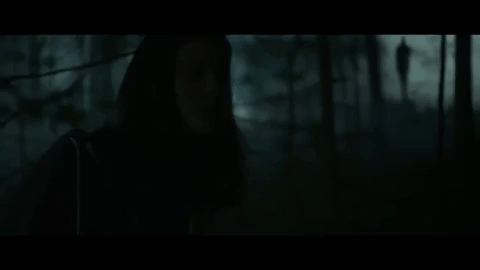
What Is The Slender Man?
Our story starts 5 years before Wisconsin hit the headlines.
In 2009, comedy website Something Awful launched a paranormal images competition. Users of the website were to mock up supernatural-inspired or horror-themed pictures, and leave them to be judged by the internet.
Eric Knudsen’s entry forged together the mystery of an urban legend and the dark reality of pedophilia.
Knudsen used pictures of children playing in playgrounds, or hanging out in friendship groups, or any other innocent gathering of youngsters, and photo-shopped a figure among them. This figure was an 8 foot tall, thin man, with a faceless, pale profile draped in a formal suit.
Emerging from his back was a set of dark, twisting tentacles.
He called him the Slender Man.

It was only when 4chan users picked up on these pictures that his urban legend infamy was set in stone.
Both the forum site and Creepypasta.com moulded his backstory, infusing the simple tales of kidnapped children with the concept of proxies - that is, children which were used to do his bidding. And it’s this premise that would alter the landscape of teenage crime - and suicides - in America.
From here the urban legend extended its tentacles, haunting the darker corners of the internet. But it was his debut in video games that drew him out into the mainstream.
In 2012, the first video game first entered our downloads folder.
The free game followed a simple principle: you wander through dark woods in the dead of the night armed with a torch and surrounded by pixelation only an early Buffy demon could muster up, and you look for 8 ‘pages’.
These pages are poorly pencilled drawings that have been left by children taken by the Slender Man - but the terror only starts here. Throughout your search you are followed by the entity titling the game.
Slender Man: The Arrival hit the shelves only two years later and followed the same concept as the original. But this time we are joined by some sense of a plot, and a few other characters, too.
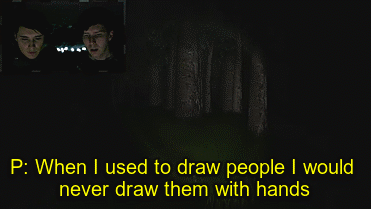
Nevertheless, the undying premise remains: he follows kids, and then he takes ‘em for himself.
Why?
This remains unknown.
But it’s this premise which fuelled the urban legend haunting the teenagers, fitting the real life cases that have scarred America.
This was confirmed in his film debut in 2018: Slender Man preyed upon the wave of crime inspired by the creepy pasta, merging the reality of the recent stabbings with the video games that put him on the map.
But this premise has scored a stab wound on our society before, fitting historic folklore far too accurately.
Crime In The Name Of The Slender Man
Wisconsin was not the only American state to witness a shocking crime inspired by this indie horror icon. In fact, a variety of other attacks pinned on the Slender Man followed a similar pattern:
One 14 year old burnt their house down, a tragedy linked to their history of reading creepypastas exploring the legend, whilst another young teen stabbed her own mother in order to please the Slender Man.
But it doesn’t stop there.
Alongside the spike in violent crime was a sharp rise in teenage suicides at the Pine Ridge Native American Reservation.
The suicide rate among the Native American population in America is already far more prevalent than any other ethnic group, but the sudden spike of 9 suicides of those aged between 12 to 24 sparked concern. And when the motives were drawn back to the Slender Man, these concerns only grew further.
The authorities even made mention to this urban legend in their official investigation, determining that the Slender Man was considered by the teenagers in the community to be a suicide spirit, a dark entity within Native American folklore. But to them, the Slender Man went by a slightly different name.
They called him the Tall Man spirit.
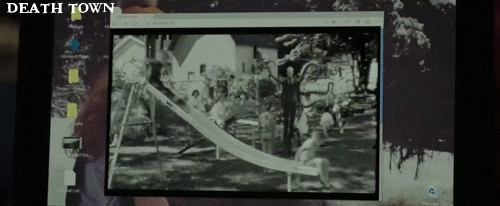
“He’s appearing to these kids and telling them to kill themselves.” - a local minister who supported youths in the community
Suicide spirits follow a similar line of thought to Catholic views of demons or evil spirits: they are negative spirits that feed off our energy. This entity in particular, however, spends its free time targeting and possessing individuals that are undergoing a spiritual crisis.
Alcoholics, addicts, the depressed - they are all worthy contenders for being the personal buffets of suicide spirits.
With a cluster of Facebook videos alluding to local folklore combined with viscous cyber-bullying encouraging the victims take their own lives, the notion of the Tall Man gathered strength, tying together the folklore of the suicide spirit and the urban legend of the Slender Man.
But this wasn’t the only time the Tall Man has been sighted in Native American communities.
In 1890, the Wounded Knee Massacre occurred.
20,000 Latoka Native Americans were left for dead by US troops. To this day it is considered one of the most atrocious acts committed against the Native American population.
And it was here that the Big Man was first seen.
Many claimed an entity taking the form of a tall man sporting a top hat would wander the reservation after the massacre, and made the younger generation take their own lives.
Whilst negative spirits donning the top hat are common outside of Native American folklore, the similarities between the Big Man and the Tall Man create an uncomfortable link between the tragedies scarring the past and present Native American population.
But this community’s folklore isn’t the only place the Slender Man has been referenced outside of the video game.
Nearly every other culture has their very own Tall Man.
Could the Slender Man have existed before the original video game even entered beta testing?
The Slender Man In Historic Folklore
When I began researching the entity’s existence - aside from being overwhelmed by the array of tragic stories - I encountered many dead ends.
One of these dead ends sticks out.
Out of all of the rumours circulating following the Wisconsin stabbings was that Slender Man originated from Romanian folklore, and was based on some similar entity possibly bearing his size, demeanour, and pastime of abducting and/or traumatising children.
This was proven to be untrue.
But upon realising the Slender Man didn’t first make his name in Romania, I discovered he had made his name in a lot of other countries.
Like a lot.
Like way too many.
From motive to dress sense, the Slender Man’s first sighting starts a couple millennia before his internet debut.
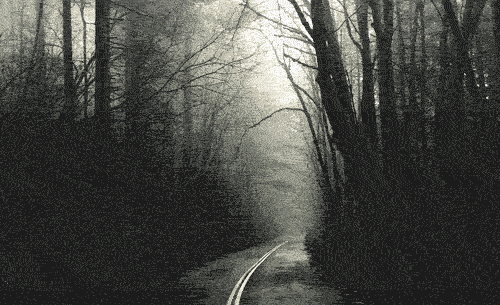
Fear Dubh from Irish folklore is the most popular contender for being the OG Slender Man, his name literally translating to ‘Black Man’. It is claimed that this entity would scare children snooping round the woods, and his title confirms his attire matches his more modern formal suit.
Germany’s Eriking too bears a resemblance to the Slender Man’s irish counterpart - with a focus on both his height and dark clothing, this internet icon might have travelled further than we think. This mythical beast prides himself on dwelling in the woods and kidnapping children, confirming he has potential for the official historic Slender Man.
However: the plot thickens when we consider another German entity known only as the Tall Man.
With the same name as the Native American suicide spirit, and the guiding principle of kidnapping kids who wander the woods, the potential for an international entity once again emerges from the darkness.
Historic legends from the American South also contain a similarity that should have you sleeping with the light on: a treelike man who kidnaps children was often spotted throughout history.
Regardless, it’s easy to decode these vague mythical creatures as warnings to their children of the dangers of wandering near uncharted territory alone and at night.
But it’s the details of the Slender Man that click together when we trace the folklore back to the oldest recorded sighting of the urban legend.
And this takes us to 9000 BC.
Both Eypgtian hieroglyphics and Aztec paintings often portray the same distinct tall, thin, menacing figure, but it’s Brazilian cave paintings that house the oldest attributes.

In these paintings you can clearly see a tall man lead a child by the hand, his unnaturally large limbs dominating the scene.
Yet aside from the Slender Man’s basic features - that of his height and incessant stalking of children - his facelessness (#new-word) is a feature we have yet to discuss. Fortunately, many cultures have already discussed it. And the greatest conversation takes place in Japan.
Japanese faceless ghosts have haunted the small island for centuries. The Noppera-bo prides itself on frightening humans, often taking the face of someone the victim knows before their features dissipate into nothingness.
All you can see is a blank, smooth, flat layer of skin, a sight only witnessed when the Slender Man finally catches up with you in his video game debut.
Whether you believe in the Slender Man or not, there is no doubt that the concept harnessed by Eric Knudsen did not begin in 2009.
We might not know when the Slender Man began hunting children, and we might not know why he does, but there is one thing for certain:
He has not finished just yet.
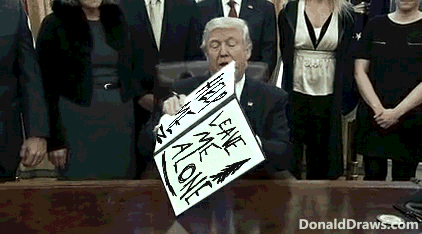
If you liked this post, chances are you’ll like my other posts, too! You will have to come out from beyond your quilt, though.
Make sure you hit follow if you want to see more stuff like this - and, you know, less traumatising posts about the paranormal every week.
Don’t forget to join my ghost hunt, too, where I post a new real ghost story everyday!
#slender man#Slenderman#slenderverse#slender the arrival#slenderman video game#creepypasta#jeff the killer#candle cove#ticci toby#urban legend#urban legends#scary urban legend#scariest urban legends#creepy urban legend#native american folklore#paranormal#supernatural#Ed and Lorraine Warren#zak bagans#real urban legends#mythical creatures#paranormal evidence#photographic evidence of ghosts#video games#horror movies#slenderman movie#8 pages#horror video games#wounded knee#slender man real
67 notes
·
View notes
Text
Top 5: Nostalgia Movies
This Top 5 is taking a trip down childhood memory lane to choose the best Nostalgia Movies - films that I loved as a kid and continue to love to this day. The film must have been watched multiple times during my youth and continue to be associated with a memory or tradition that was an important marker of growing up. Therefore, any film produced past 2004, when I graduated high school, has not been considered - and, to even make the cut, the film must be associated with more than just constant re-watches in our downstairs rec room (arranged with a HUGE - well, big for the ‘90s - screen with actual surround sound that my dad installed); rather, these films must be an essential part of my childhood progression into adult-hood and laid the groundwork for a future of loving cinema.
Gibelwho Productions Presents Nostalgia Movies:
5. Ferris Bueller’s Day Off
4. X-Men
3. The Little Mermaid
2. Indiana Jones and the Last Crusade
1. Newsies
Ferris Bueller’s Day Off (1986): As my high school career began to wrap up and I was looking ahead to college (where I had already committed to attending film school), my mother informed me of a proclamation - I was not allowed to leave her household without watching Ferris Bueller. Perhaps she knew that she needed to instill a little bit of rule-breaking encouragement into her straight A / type A child before I was to head out into the unruly world of college, but nonetheless, this film left a mark with it’s delightful adventures of Ferris, Cameron, and Sloane. Years later, I attended an LA rooftop screening where the audience all danced during the Twist and Shout parade, bringing me straight back to the joy of discovering this film with my mom. In the same tradition, I will be sure to make my kids watch this film before they leave our household for the wide world so they can learn to cause a little innocent rule-breaking. Save Ferris!
X-Men (2000): I had a secret obsession when I was a kid - I LOVED Marvel Comics. I had read all of my dad’s comic book collection from when he was a kid, I started my own collection, and had even started tracking the value of each issue. But I was a girl, and did not share this particular passion with my fellow elementary school friends (ahhh, the fear of being judged by your peers). So when I entered a movie theater as a freshman in high school (with my secret still intact) to see an X-Men film and the place was PACKED, I couldn’t contain my excitement that maybe, just maybe, more people would be into these characters and storylines. Then, when I went into my summer theatre program and my friends used X-Men characters as improv inspiration, I thought...this is going mainstream! I still didn’t confide my true colors until the MCU began and my college friends discovered that I knew a...lot more about Iron Man’s backstory than should be possible and I was officially outed. So, fully embracing my nerdom, I traveled to San Diego to the sacred ground that was Comic Con, truly cementing my love of Marvel. And now the rest of the world has caught up to why these characters are so special. That first inkling of a wider world loving what I loved started when I watched X-Men in theaters - seeing my heroes on the big screen, fighting their super villains, and the packed crowd around me was digging it!
The Little Mermaid (1989): One of my earliest memories of opening presents was from my 6th birthday, sitting in the living room and ripping open the wrapping paper to discover the VHS for The Little Mermaid - a film I had seen at school and LOVED - and now it was mine to watch at any time! Truly a special Disney moment, which is also matched with many other memories of Disney animated films (the momentous opening to Lion King and the cut to black that took my breath away in the theater, playing the Mulan soundtrack on cassette over and over singing Reflection, and identifying with Belle’s obsession with reading). I was very much the target audience for the Disney Renaissance, and I ate up all the music, the (slightly) stronger portrayal of women, and our VHS collection only grew to include all of these modern classics. The Little Mermaid kicked off a golden age for Disney Animation and little Katie grew up on the Alan Menken soundtrack.
Indiana Jones and the Last Crusade (1989): Our family had three fancy VHS boxed sets for three different franchises and we watched these flicks on repeat - Star Trek movies (TOS with Kirk and Spock), the Star Wars trilogy, and the Indiana Jones films. Literally any one of the movies from these collections could make this slot, but since both of the Star franchises have already gotten love in these Top 5 lists, I’m going to pick representation from our resident archaeological professor / international adventurer. My favorite of the bunch is the third - from the thrilling opening of young Indy, to the dynamic between father and son, and the epic ending of selecting the correct Grail (“you have chosen...wisely”). Watching any one of these films is just comfort food for my soul, taking me back to the family settling in to watch in our downstairs rec room, setting the foundation for the nerdom that my parents instilled into me at a young age and that has continued to guide my interests and movie-watching to this day.
Newsies (1992): Growing up, my family had Friday movie nights, where we ordered from the Pizza Hut that was right next to a Blockbuster; my brother and I were allowed to each choose a movie to rent for the weekend. I went through a phase where I just rented Newsies on repeat. It was as though this film was made just for me - a musical, set in a historical time period, with cute boys singing and dancing, music by the magical Alan Menken - what is not to love?!? I was so obsessed with this movie that in the pre-Internet age, I wrote down the lyrics by meticulously listening, pausing, writing down, rewinding, and repeating - which was an onerous process when one was working with manual VHS tapes. I eventually got a copy of my own, the DVD when it came out, the CD of the soundtrack, and also the piano sheet music. I knew all the lines to the songs, and could probably to this day quote the majority of the movie. Years later, imagine my delight when Disney produced a Broadway musical of the movie - we took a special trip to New York on my birthday to see the show (which of course, doesn’t match up to my love for the film, the true effect of a nostalgic love for a piece of your childhood). Living in LA affords us the opportunity for magical movie-going experiences, and my husband and I scored tickets to a special showing of Newsies at the Disney El Capitan theater - and then the traveling Broadway company of Newsies the musical that was in town and performing just up the street at the Pantages theater made an appearance and performed for the audience after the movie wrapped. This film has held a special place in my heart and is the epitome of nostalgia love for a movie from childhood.
Honorable Mentions:
The Music Man (1962): The two music genres we listened to growing up were 90s country (Garth, Reba, Trisha, Wynonna!) and also musicals. Our family was very much into theater and starting at the age of twelve, I started acting in musicals at our local performing arts program for youths. Our family also watched many of the classic musicals that were filmed in the 1950s and 60s, such as Hello, Dolly, Oklahoma, and Music Man. This last film stands in as a proxy for all those classics, but was also selected in particular because I performed in a production during a summer in junior high, where I was in the background chorus (and featured in the Wells Fargo song!). The music and lyrics of this story, written by Meredith Wilson, are of such cleverness and variety - from the 4-part harmony barbershop quartet to the love song ballads, the pre-hip hop rhythmic talking song to the genius opening number of the salesmen on the train. The translation to film is serviceable and very much in the style of the musicals brought from stage to screen in the 1960s - nothing too clever and some blocking that sought to recreate a theater stage on the film set, but these series of musical films cemented my love for the genre in an accessible way just as I was starting myself to perform on stage.
Jurassic Park (1993): Oh, the raptor in the kitchen stalking the two kids stills brings me chills thinking about it. Watching that scene as a kid, I (more than once) fled the room because it was so scary! This film had it all - creepy dinosaurs, a smart teenage girl and an even smarter heroine that was a scientist, great music (whose theme I diligently learned how to play on the piano), and plenty of action! My family definitely had this on repeat in the VHS player, but I loved the movie so much that I ended up reading Michael Crichton’s novel to experience the source material - and became more aware of how a film is an adaption of a novel’s storytelling, translating from the page to the screen. I do fall in favor of reading the novel before seeing the movie, but if a film helps you discover an incredible book, it can be like diving into an extension of the world beyond what the screen can fit.
3 notes
·
View notes
Text
incoherently written music history #1: billie eilish is the gen z taylor swift and here’s why
don’t laugh at me for making my first history rambling start from 2006 okay i promise i’ll be taking these further back eventually
this particular claim was made in a conversation i had with a friend a few weeks ago and i figured what better way to start off my new tumblr experience right
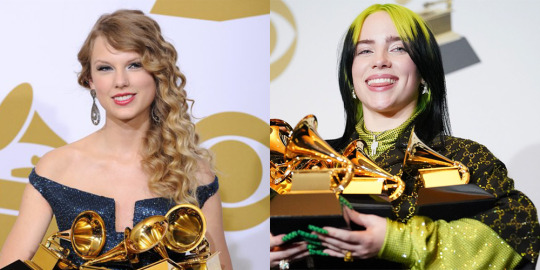
these pictures of almost identical scenes were taken almost exactly ten years apart. how did both of these ladies become mega-stars and redefine their respective genres as teenagers and what do they have in common? let’s discuss.
for starters, female singer-songwriters are not a new phenomenon. alanis morissette, tori amos, annie lennox, kate bush, the list goes on. so why were taylor and billie good representatives of the late 00s and late 10s respectively?
taylor swift released her self-titled debut album in 2006 as a country singer/songwriter at the age of 16 which is pretty impressive! and billie eilish released her debut album WHEN WE ALL FALL ASLEEP, WHERE DO WE GO? last year in 2019 at the age of 17.
although there are plenty of young singers/songwriters, not many of them can reach this level of success. and at first glance (just look at the covers of taylor’s lover and billie’s album, for example) they seem like opposites. but they actually have quite a bit in common!
both started their careers with an audience that is primarily composed of young girls
both wrote or cowrote the songs on their albums
both perfectly capture the mood of the time periods in which they became popular
while taylor debuted in 2006, in my opinion, she didn’t become a superstar until the release of fearless in 2008. considering this was now 12-14 years ago, the process of becoming a superstar was different than it was just last year. taylor was originally signed as a songwriter with sony/atv (the youngest EVER to do so at age 14) and literally built the big machine label with her success when she signed with them. with the rise of streaming and widespread usage of the internet for listening to music (which didn’t exist in 2006-2008 when all music was individually purchased), billie entered the public eye when she released ocean eyes on soundcloud and rose to megastardom within a few years, with a pretty astonishing speed. the picture of taylor swift with her grammys was taken in 2010, a full four years after her debut album was released while billie won all those awards for her debut album in the same year it was released. the rise of such platforms can certainly accelerate the path to superstardom, and it certainly did in this case.
the important note here is that for both, the audience heavily relates to the emotions in the music and the authenticity of the songwriting. taylor’s music suits the early 00s and the young millennials/zillennials well. in the mid to late 2000s, music was upbeat. pop punk and emo pop/rock like fall out boy, panic! at the disco, and my chemical romance were at their peak (just remember early tumblr), and a lot of pop and pop adjacent music was generally happy and fast paced. taylor brought country music to the previously untapped market of teenage girls (and eventually other young female country singers like kacey musgraves, kelsea ballerini, maren morris, etc became popular, almost certainly because taylor proved young women could be successful in the genre) even as she transitioned into a pop artist. she succeeded as a teenage girl in an extremely male dominated genre (in fact, to this day, many country stations are not allowed to play two songs by female artists in a row).
taylor’s greatest strength is still considered to be her songwriting, and many of her lyrics are second to none in terms of modern mainstream artists. her fans appreciate the vulnerability and pure emotion of songs like all too well and dear john, even though they’re generally less well known than many of her hits. even through multiple genre shifts, her storytelling still shines through and feels authentic even if occasionally interspersed with more lighthearted moments like me! or we are never ever getting back together. in fact, the recent folklore album appears to be a return to the very thing that brought her to prominence in the first place, with its focus on lyrics and real instrumentation rather than her recent more synth-heavy pop sound.
people related to her music because it felt like they were getting a glimpse into her diary, and that authenticity wasn’t necessarily present in pop music at the time. she appealed to the hopeless romantics (especially during the fearless and speak now eras) and was definitely relatable to the teenage girls of the 00s. taylor captured the hope and heartbreak of teenagers in such an elegant way, and many of her fans still feel closely connected to her and have a sense of “growing up with her”, even if they’ve never met her in person because of the evolution of her persona and storytelling (and also her former use of tumblr). her songwriting talents are what initially drew fans to her and why she has a such a loyal base of fans even fourteen years after the release of her first music.
however, things are different now than they were even ten years ago. young people are sad and angry and billie captures these emotions in her music. today’s teenagers are not interested in sparkles and ball gowns or sundresses and cowboy boots, but would rather wear oversized tshirts/hoodies and march in protests. they were looking for someone who dresses uniquely and who takes pride in being different. it’s clear to see even through gen z humour that happiness is generally a thing of the past. pop music has gotten slower, more melancholy, more indie-oriented, and hip hop/rap and edm-inspired music is currently topping the charts rather than bubbly pop or rock. billie represents and possibly started the trend of “bedroom pop” (as her album was quite literally recorded in a bedroom) and its more relaxed, lofi sound. with this in mind, taylor has been and continues to be a master of trends and versatility, including releasing the 1989 album before retro nostalgia became popular, as well as including elements of every conceivable genre, including hip hop (throughout all of reputation), pop punk (paper rings is essentially a pop punk song, and i will defend this claim), rock, indie, and even folk and funk in her music.
this shift almost resembles the way punk and grunge were rejections of mainstream rock at the time; people are looking for something new and “fresh”, and for many young gen z girls, that took the form of billie eilish, since she captures the emotions they’re feeling just like taylor did for millennials. in fact, billie can almost be seen as the punk to taylor’s classic rock. the way billie can speak to this audience is remarkably similar to the way taylor spoke to the underserved market of teenage girls who like country music and fairytale romances (and reminiscent of early rock’s roots in genres that were neglected by mainstream pop radio at the time until being succeeded by activist punk music that rejected the theatrics and fancy production of 70s rock in favour of a DIY ethos). both were appropriate for their target audience.
in short, taylor’s brand wouldn’t have worked in 2019 and billie’s brand likely wouldn’t have worked in 2006, but they suit the atmosphere of their actual time periods. we can no more expect a star of the 00s to represent the teenagers of the current era any more than we can expect a star of the 80s to do the same. however, their popularity comes from the same sort of energy - young people wanting something outside of the contemporary mainstream that feels new and expresses the emotions they may not have been able to express themselves. while taylor represents teenage dreams, billie represents teenage rebellion and loneliness.
in addition, both have been politically active, as well as advocating for change in the music industry. taylor has a long history of fighting for artists’ rights, including not releasing her music to apple music until they agreed to pay artists during the three month trial period, the feud with spotify, and now her struggle to gain control of the masters for her first six albums. she has also expressed support for democratic politicians and social movements like black lives matter, despite people close to her expressing concerns that it would cause damage to her image or career. billie has also been vocal in supporting progressive causes, which again shows that she is a perfect representative of gen z stardom as young fans expect the celebrities they support to use their platform to speak about important issues.
the most important thing that links these two artists together is the impression of being genuine and relatable, especially for an audience of young women who feel as if their voices have not been heard or are not valued by the mainstream. another interesting note is that fans of both artists are/were mocked for being fans, which is almost certainly rooted in misogyny and the dismissal/trivialization of things that are enjoyed by teenage girls. neither of them are taken as seriously as they deserve to be.
for years, taylor’s music was generalized as only being about her ex boyfriends, and that opinion is still widespread, despite the fact she has incredible songs that weren’t written about romantic relationships. since the beginning, taylor and her fans have been relentlessly mocked and dismissed. taylor was bullied online to such an extent in 2016 that she disappeared from the public eye and released the reputation album in order to take back the narrative after being accused of lying and being a “snake” even though it was later shown that she had, in fact, been truthful about the situation. billie’s fans have also been mocked in the past, even though both artists have been revolutionizing pop music and will likely continue doing so. they have also expressed their strong support for each other in the past!
it’s truly past time that people recognize the power of young women to change the music industry and society as a whole. taylor and billie are good examples of a constantly changing music scene, and how the “faces” of music can be drastically different depending on generations and the demands of society and the industry. taylor and billie are both trailblazing trendsetters who have successfully tapped into the unique energy of youth in their own ways, and the way they seem almost like night and day shows just how different millennials and gen z are as teenagers.
5 notes
·
View notes
Photo

NOTE: Google translation (LiunaticFringe highlighting)
Lucy Liu: Root Freedom | Jia Ren Cover
2020 opened a new decade.
Idols of the eighties,
Some are still active on the screen and the Internet.
Some have disappeared,
Some are also attracting much attention,
Some have fallen asleep.
We finally arrived at the "future" in science fiction,
Discover with Liu Yuling the familiar sense of time in this "future."
(Gucci lace dress
Tiffany T1 Wide Ring in 18K Rose Gold
Tiffany T1 Narrow Bracelet with Diamonds in 18K Rose Gold
Tiffany T1 Wide Bangle in 18K Rose Gold with Diamonds
Tiffany T1 Narrow Bracelet in 18K Rose Gold
Tiffany T1 Narrow Ring in 18K Rose Gold
Tiffany T1 Narrow Diamond Ring in 18K Rose Gold
Tiffany T1 Wide Ring in 18K Rose Gold with Diamonds
Tiffany T1 Wide Bangle in 18K Rose Gold with Diamonds)
At 11:30 am, in the city of Brooklyn, New York, a 19th-century warehouse remodeled art community and creative studio, Liu Yuling, full of silver hair, wore large retro glasses and her body turned sideways. She was holding an eleven-inch old-fashioned black-and-white TV in her right hand, and the antenna stood like unruly hair, and the screen was flashing monotonous white noise lines, just in the same direction as her black-and-white striped tie. The prototype of this shape is Andy Warhol.
After the April issue of "Jia Ren" covers the retro theme of the 1980s, Liu Yuling proposed that it should be more interesting to play. She worked with the creative team to select several fashion icons that have a profound impact on her personally and the world-David Bowie, Prince, BoyGeorge, Debbie Harry , Madonna and Andy Warhol, re-enact their classic looks with seasonal fashion. The last idol is Liu Yuling herself. Two sets of fashions are the retro punk style of the 1980s and the modern minimalist department. The New Wave movement of the 1980s has become an old dream, and Liu Yuling is pushing the new wave of this era.
This original look from Andy Warhol comes from the cable television show Andy Warhol Online that he launched in the 1980s. He was addicted to TV and said, "I love TV, and I'm super jealous of people who can have their own programs on TV. I also want to have my own program."
In 1979, he spent $ 40,000 on a premium broadcast-quality camera, and hired professional television producers to start broadcasting his own programs on Manhattan Cable at his own expense. The television dream continued throughout his eighties, until 1987, when he suddenly died of a myocardial infarction.
Artists who do not want to be on TV are not good actors. Like Andy, Liu Yuling has a strong curiosity in all aspects of the world and has made breakthroughs in different fields. At the age of fifteen, she wants to be an artist. She creates collages, walks through the streets of New York with a big camera, and transfers from the Department of Communication at New York University to study Asian language and culture at the University of Michigan. During college, she was spotted by scouts in the New York subway, she took commercial shots of stationery stores, and began to take on guest roles in some episodes. Until the last year of college, she was selected by the student troupe to star in "Alice's Adventures in Wonderland", after which she began to fully realize her actor dream.
She said to herself that she had never thought of giving up since the moment she made her decision. On the Hollywood screen, there are few faces of Chinese-American actors. It is even more difficult for her petite and ordinary person to want to break out of her own world. On her first debut, she lived in two small jobs and lived in a small apartment rented by her brother, rushing to deliver resumes, auditions, and appointments. Looking back, Liu Yuling said: "I am brave and simple. I think pure is a good thing because it means freedom. I just want to learn and do what I like to do."
At the age of 29, Liu Yuling had debuted for eight years. She first appeared on the screen as a hostess in "Flying Over Beverly Hills" (1991), and later as a female student in the CBS drama "Pearl", her popularity has gradually increased. And what really made her fame was that she played the Chinese lawyer Wu Ling in the American drama `` Sweet Girl '', a clever, cool, decisive and slightly weird character that won the hearts of the audience with a strong aura. It also subverts the stereotype of Chinese Americans in American film and television works.
It was originally a temporary arrangement with only eight episodes, but screenwriter David Kelly changed her role to a resident character at the request of the audience. The incident sparked widespread debate in the American community about the Asian impression, and she was nominated for the Primetime Emmy Award.
Every character since then, whether it is the fiercely popular special agent in "Pili Jiaowa", the elegant and cold killer in "Kill Bill", or the female version of "Watson" in "Holmes: Basic Deduction", or In the exaggerated socialite of the woman, Liu Yuling is always climbing over various invisible glass ceilings, transcending the gulf of identity, gender, and age, and challenging seemingly impossible roles.
To this day, Liu Yuling still devotes herself to life and work with the courage and simplicity of her debut. For her, every day is a new beginning, and it is worth investing all your energy in learning, reading, and experience. Create new selves in the process of meeting different people.
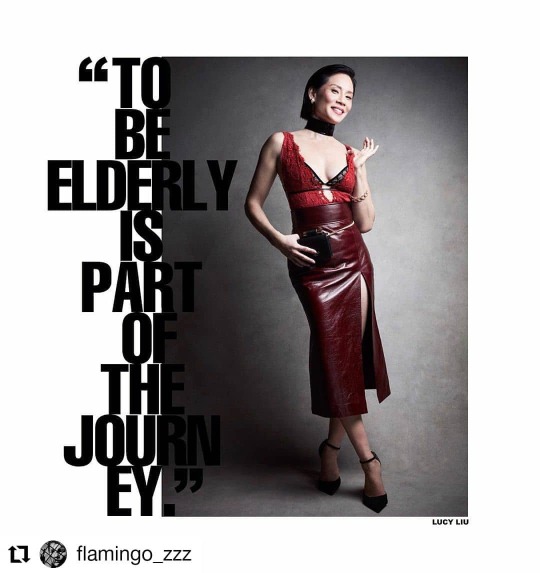
Lace vest, bra, leather slit skirt
Patent leather wide neckband and mini chain bag are GUCCI
Tiffany SCHLUMBERGER series
18K Yellow Gold Braided Diamond Ear Clip
Tiffany SCHLUMBERGER series
18K yellow gold square cutout bracelets are TIFFANY & CO.
According to current buzzwords, Liu Yuling is an out-of-the-box slash youth, acting, hosting, director, producer, game dubbing, artistic creation, United Nations Children's Fund ambassador, she is fully committed to every job. At the age of forty-six, she made the bravest decision in her life and helped her become a self-selected single mother through third-party transplantation for in vitro fertilization. For Liu Yuling, there is no difference in work. As long as you start, you must take it seriously.
The itinerary of the day of shooting was dense from morning to night. At eight in the morning, she personally sent her four-year-old son to school, and then rushed to the shooting scene in Brooklyn. The filming continued from 9:30 a.m. to the evening. Seven sets of looks were made, and the staff took turns to change the work. And Liu Yuling maintains a high degree of concentration throughout the process, injecting soul into each character, sometimes it is David Bowie, who is male and female, sometimes sexy Madonna, sometimes a neutral and feminine George boy, sometimes an eclectic security. Di Warhol.
Instead of playing them, she gave them part of herself. She used her body and soul to travel through time and space and talk to them. In the end, she returned to herself. She didn't want to conceal the wrinkles in the corner of her eyes, all the wind and frost was smoothed by the eyes of understanding the world.
At 11.40 in the evening, half of the staff had already left the field, and Liu Yuling was finally able to change into her original clothes and sit at the dressing table to remove makeup. Suddenly remembered something, she turned back and said aloud to the rest of the staff: "Thank you."
There were many people at the beginning, and she always stayed to the last.
She has been an actor since she was nineteen years old, and still loves acting, and her role has become increasingly full. In the long course of her life, she kept adding new roles for herself.
She appeared in the "Kung Fu Panda" series as a beautiful woman snake, and then accepted a series of game voice acting work, including "High Speed Skiing", "Thunderbolt: Thrilling Game" and "Rogue Blood". Liu Yuling said that in real life, she doesn't play games often, but she also devotes herself when playing. She is always trying new things, and sound performances allow her to delve into different ways of acting. She is also passionate about the director. In 2010, she started crying and started shooting a short film "Mena" in Mumbai, based on the Indian girl Mena who was trafficked as a sex slave at the age of eleven, and then directed the sixth season of "Holmes: Basic Deduction", and The eighth episode of Deadly Woman.
In the play, she likes the replacement of different identities. The same is true in real life. As an actor, she is located at one end of the lens to pass the role to the world. The director's work allowed her to stand on the other side of the camera, and through communication and collaboration, the entire team understood the picture she wanted to convey and made it a reality.
She said: "If I don’t have enthusiasm, I won't do it. And if I love it, I will go all out every day with my eyes open. My personality is so strong that I can't spend my life in peace, Everything is necessary to go all out, whether it is to be a chef, an actor, or even in a garment factory, I must inject all the energy and do my best. "She did the work of the garment factory. Yuling Liu, who grew up in Queens, New York, is a second-generation immigrant. Originally a senior intellectual's parents immigrated to the United States in the 1960s and found it difficult to enter the mainstream American society. In order to subsidize households, she was doing two jobs at the same time: serving plates and working in a garment factory. Since then, she has been working in the performing arts circle to support the actor's dream.
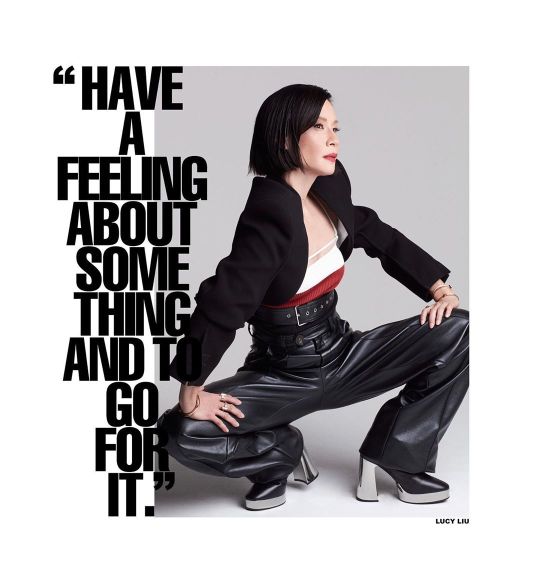
(Tiffany T1 Wide Ring in 18K Rose Gold with Diamonds
Tiffany T1 Wide Ring in 18K Rose Gold
Tiffany T1 18K Rose Gold Wide Bangle
Tiffany T1 Narrow Bracelet with Diamonds in 18K Rose Gold
Tiffany T1 Wide Bangle in 18K Rose Gold with Diamonds
Tiffany T1 Narrow Bracelet in 18K Rose Gold
Both are TIFFANY & CO.
Knitted suspenders, leather trousers, short jacket
Both are PETERDO
Chunky High Heel Ankle Boots GUCCI)
Liu Yuling grew up in a harsh family with almost militarized management. Parents are struggling for a living, and they don't have much time for spiritual communication except eating and sleeping. It wasn't until her father had cancer that she had the opportunity to talk to him more about how Chinese culture and immigration experience shaped him and connected his family. Now, she takes the sick mother back to live with her and her son, and examines everything that went through her childhood, as if she knew each other again.
Son Rockwell grew up in New York and has lived in the spotlight since he was a child. However, Liu Yuling still hoped that he would grow up in a low-key environment and teach him the meaning of work and his mission as a person: "I want him to realize that material is not the most important thing. I grew up in a material-deficient environment. I don’t think life is lacking. Understanding the value of hard work, being a humble person, and loving what you do is an unparalleled gift. I think the most exciting thing is to do what you do with love. He may want to be a doctor, an artist, it doesn't matter what he wants to do. I just hope that he can pursue his dreams bravely and fearlessly. "
As the second generation of immigrants, Liu Yuling felt the empathy of the late actress Huang Liushuang in the difficult immigration life and the pressure of ethnic minorities. On February 8, 1960, the name of Huang Liushuang, (Anna May Wong) who had died, appeared on the Hollywood Walk of Fame, becoming the first Chinese-American actress to stay here. Sixty years later, Liu Yuling left the second star next to her name, becoming the second Chinese actress to leave her name here.
At the beginning of the 20th century, Huang Liushuang was born in Chinatown, Los Angeles, and his father made a living from the laundry. With a Chinese face, she was racially discriminated from an early age.After entering Hollywood, she could only play the Asians under the stereotype-prostitutes, Mongolian slaves, often dying by death, gorgeous but weak, usually attached to high-ranking White male. In the end of his life, Huang Liushuang couldn't get rid of the Chinese face of Hollywood, nor could he get the approval of the Chinese. The number of films gradually decreased, and eventually he died of heart disease due to excessive drinking.
During the star awarding ceremony, Liu Yuling said: "How lucky I am to have seniors like Huang Liushuang and Bruce Lee to lay the ground for Chinese actors. If my life's work can bridge the gap, the role of stereotypes played in Huang Liushuang is now mainstream in Asian I will be very happy to build a bridge in the role of the movie industry. I am also part of this change. "
Speaking of Huang Liushuang, Liu Yuling was quite moved: "Huang Liushuang has never realized the dream of a real actor. I think she died because of a broken heart. She has enthusiasm but cannot share. She plays various stereotyped roles, but cannot find To the true self. That must be very unbearable. "
Where is her true self? Liu Yuling recalled her childhood. The family did not bring her nourishment of art and culture. The Chinese family struggling with the food and clothing line did not have time to take the children to appreciate and feel the beauty. And she was looking for beauty on the cement street, between the dirt. In the cracks in the street, there are ants, and under the soil, there are snail shells. There is not much space in reinforced concrete New York, but she will spend hours squatting on the ground, staring at the cracks in the ground, trying to find the mysteries of the universe from them.
The mystery of the universe was opened to her further after she transferred from New York University to Michigan.
At the University of Michigan, Liu Yuling chose to major in Asian language and culture. She hopes to leave New York and study her subjects in a quieter city and learn about her native culture: "I want to go deeper into Chinese and study Asian philosophy, which will help me better understand myself and my parents At that time, I just connected the dots, stepped back, and saw the complete picture for the first time in my life.
I feel like I've been holding my breath for a long time, and finally I can breathe out. And when you exhale, you finally see your place in the world, their place in the world, and the relationship between the world and you. It's as if the lens is zoomed out and you start to see everything as it was. With this perspective, you can finally accept yourself and others emotionally, really enjoy getting along with others, and know what you really want. "
Participating in the summer project of Beijing Normal University gave her the opportunity to come to China for the first time. Liu Yuling recalled that it was an incredible journey of self-exploration: "For the first time in my life, I looked at the people around me, all of whom had the same skin color and the same eyes. I finally knew where I came from. Mountains and rivers I feel like part of them. I finally found a sense of cultural belonging. Everything has a new meaning. "
If the streets and lanes brought Liu Yuling's first contact with contemporary China, then the trip to the Temple of Heaven made it possible for her to visually connect with this ancient civilization. Numbers, colors, shapes, and every detail are closely linked to the cosmic view of heaven and man.
The prayer hall has four large columns, which symbolize the four seasons of the year; the twelve gold pillars in the middle layer, which symbolize the twelve months of the year; the twelve pillars in the outer layer, which means twelve hours a day; Implied twenty-four solar terms. Long history contains wisdom connected with nature. Liu Yuling closed her eyes and clearly described what she saw and said at the time: "We cannot change the flow of the four seasons, the ebb and flow. We are part of nature and the universe. All the content learned in these books is presented in front of me in an intuitive image. It's like reading a classic for the first time, and you can't believe that you met it for the first time in your life. And for centuries, it has been waiting for you in this world. "
Rumi's poems give her the same feeling: "They are so simple, yet so timeless. About friendship, about love, about death. People have not yet invented language, but only communicated through stones and symbols. When you were young, you thought that the world started with you and finally you, and gradually grew, and you realized that you are only a small component. The more you see, the more you can break through your small cage and become Humility and harmony. "
"At this moment, I was tied to the cane of love; at this moment, I gave up thinking about the consequences ... I destroyed my thoughts and eliminated my anxiety. What else do I need? Blood flows in my veins. I am life itself. "— Rumi
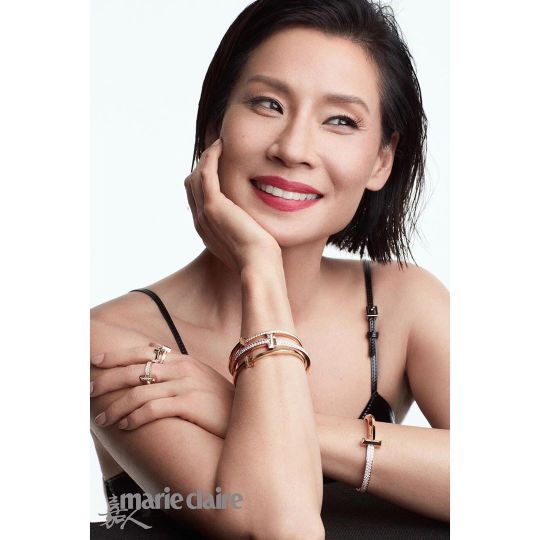
"I didn't start to be a mother at that time. I would work all night in the studio. Art immerses me and forgets the passage of time. I thought it was only an hour, but it was dawn. I remember I had a chocolate Colored Labrador, it will sit in the studio with me, and then go back to sleep in the bedroom. Sometimes it will come back, sigh in front of me, and then get down. Then I will You know, I've forgotten time again. It's as if the whole night suddenly disappeared. "
She closed her eyes and seemed to catch the most accurate sentence from the air: "Time is condensed."
Liu Yuling's career as an artist began almost simultaneously with her career as an actor. Since 1993, she has begun her creative work. She has been involved in various art media, photography, abstract expression style oil painting, ink painting, sketching, screen printing, and collages and installations.
Her love for art made her choose Andy Warhol as one of the tribute idols for this shoot. Liu Yuling appreciates Andy's talent in bringing commercial art to the extreme, and also appreciates his solitary appreciation. She also likes Willem de Kooning, Georgia O 'Keeffe, whose influence can be seen in her Chunga oil painting series. The images of these works are from the Spring Palace in the Ukiyo-e paintings of the 17th century. They use bold and vivid colors to show the wanton display of love.
Liu Yuling's Totem series explores the human spine, and she embroiders human bones with threads on bare linen. Liu Yuling said that if she returns to college, she may choose to continue to explore medicine, understand the structure of the body and organs, and how they operate precisely. For her, the spine represents the basic characteristics of human nature, and the different textures in each work symbolize the deep interpretation of different emotions. The spine is also like a node in life. In the perception of pain, emotions are always closely connected with the body.
In 2019, he presented the double exhibition "Unhomed Belonging" with artist Rao Shubi at the National Gallery of Singapore, covering works from various media. The highlight of this artist's career made her realize the inherent connection in her creative medium. As early as 2008, she has started using ready-made objects for her creations, and the newly presented Lost and Found series further extends the method of misappropriating ready-made objects. Liu Yuling collected overprinted and discarded book covers at a printing factory in Italy, rebind them into books, cut the inside pages, and embedded them in everyday life, such as shells, rocks, and soft drinks Tins, paper coffee cups, metal accessories.
Liu Yuling said: "These lost things once belonged to them and were abandoned after they were used. In these pages, they found a new home." The 195 bound books presented at the exhibition contain the items The stories of different places, different cities, and different people, and at this time they are converged by the cause of fate, Liu Yuling found a new home for some of them. At the time of sale, ten books will be recommended to the collector as a whole group. Liu Yuling will choose the content of the book based on the people in the collection, so the final "library" will have an internal connection with the new home.
If different works reflect different aspects of Liu Yuling's character, then the identity of the artist and the actor are also her different aspects. She cannot make a choice: "I am an actor and an artist." The two often meet, but they have some differences. Different: "Creation requires privacy and absolute focus, while actors need to work with the lens and collaboration."
What is the purpose of this kind of identity? Liu Yuling explores exactly on each road. Over the age of fifty, Liu Yuling has gone through a lot of life and death. The Seventy Two series is inspired by the Hebrew alphabetic sequence of 72 God's names. The Velocity series focuses on individual choices in collective events. After the 9/11 terrorist attack, she took a picture of the New York City skyline at Battery Park, the site of the attack, and became the background for this group of works. "People who jump off the ninety-ninth floor know that they are not alive. But they still hold their hands and jump out of the window. Maybe they believe that as long as they hold their hands firmly, they can find another one after death. road."
On top of the collage photos are found items found on the ruins, as well as poems she wrote: "I will search all corners, as if rain covered every street in the world. I will find you."
At twelve in the evening, Liu Yuling finally stepped out of the shooting scene. There is no rain tonight in New York, but there is a salty tide brought by the East River. In endless time, among countless stars, what is she looking for? Thought that what is lost will always find belonging at the other end.
8 notes
·
View notes
Text
Social Anxiety Origin Story
Social Anxiety is classified as a disorder. Isn’t that crazy!? You can actually read up on it on the MayoClinic or Webmd websites which shows that it really is a legitimate thing; it's not just you being a pussy. Most people who have social anxiety disorder don’t know what it is or why they’re like this. When we first become aware of our incomprehensible phobia we usually feel completely alien. People with this ailment tend to feel like the ultimate freaks, which knocks down their self esteem tenfold. If you have desperately searched online to potentially find answers: I feel you. The first time I felt a sense of belonging in this world was browsing through internet forums, reading about how people had the same irrational fears I did. You can find comfort in it sure, but it's definitely not the same as finding belonging in person. I didn’t know that I wasn’t completely alone in this struggle until I was maybe fifteen or sixteen years old navigating through my insufferable high school life! During that time google searches quickly became my best friend.
I can’t even really pinpoint where my SAD began for me. As a child I was pretty shy but I’d eventually open up once I became semi-comfortable. I didn’t ruminate whether or not I made some sort of fool of myself publicly. I was just having a blast man. Childhood is all fun and games but you really do get the carpet ripped out from under you when you enter adolescence.
I grew up a very privileged child financially - my parents both being middle class. My bills were all taken care of, and I didn't have to worry too much about the connections I would make with others in life. I was a kid. When a kid has no friends it's sad, but when an adult has no friends you wonder what they did wrong and you try to steer clear of them. There must be a reason why they are friendless: they must fetishize feet in their spare time! When you’re a child your only occupation is being a student. I’d wake up, go to school, learn stuff, socialize a bit among peers and then go home to watch TV and repeat, not questioning or overthinking the minutiae or idiosyncrasies in my life; just living day by day. Everything was smooth sailing. I figured I would hit my peak as a teenager and do all the cool teenagery things I saw on television like going to parties, making the cheerleading squad (though I’m not athletic at all; it would just happen), and have a tumultuous relationship with several boys. I’d pick the most special one to lose my virginity to on prom night! Then college would come, I’d go there and graduate and get a job. Sounds simple right!?
WRONG!
Hitting puberty was a big eye opener for me. It’s like once I menstruated my self-esteem plummeted. Everything about life just seemed a lot more competitive. There are all these milestones that society expects you to complete by certain ages: your first beer, your first kiss, your first fornication, your first job. All terrible and unfamiliar things! Now that I had bled and grown boobs, I was in the process of becoming a woman. I had to start making preparations to accomplish these milestones.
Seventh grade was the first year of my life I was depressed, and that terrible feeling hasn’t really depleted all that much since. In sixth grade I felt like a rock star… until the end of the year. I was a downright bully, mocking people in my class for the way they looked and acted. Some of my classmates found me funny, and I liked feeling that bold. I liked knowing that people were on the edge of their seats waiting for me to comment on a situation. It wasn’t until the end of the school year when one of the girls I heavily bullied called me out on my malicious means of garnering attention from my peers. She didn’t even insult me, she just spat out the truth. “You’re mean KRISTEN! You’re a BULLY!”
I can’t even explain how thrown off I felt by that mere observation. I never questioned why I did what I did; I liked the attention. I liked being someone people would be eager to hear from to know my latest outrageous comments on what surrounds us. Hearing this girl call me out for being a mean bully was a gut punch like no other. I couldn’t believe my ears. To me this girl wasn’t a person; she was a vessel. Someone to make fun of. Someone who was an easy target because she had a whole line of insults thrown her way since even before I saw her as easy prey.
No one ever downright called me out on my behavior. My dad did tell my mom that I was a horrible daughter, and he even asked who would want to have a daughter like me. But that was mostly because I was disrespectful towards him. Such a justified comment for a parent to make about his adolescent daughter right in front of her :)
That summer break I had tons of time to reflect upon my actions. I recognized how downright awful I had been to a lot of my classmates and vowed to make amends in the coming school year. I want to say, most of the bullying took place before I began menstruating, so you can blame my abhorrent behavior on my lack of emotional resonance and the fact that my womanly empathy and sympathy had not yet kicked in. That’s how I excuse how I acted.
So by seventh grade I was menstruating, and I grew D cup breasts overnight. I became a stand-up person - someone who didn’t throw vulnerable people under the bus for my own benefit. I became what you would call... “compassionate.”
Seventh grade was the year everything went downhill for me. Maybe it was the hormones kicking in and getting the better of me, or maybe it was me becoming more aware of what society deems as acceptable and proper. I felt like I should be cultivating a role in society, and I didn’t know what role to take. I couldn’t be loud and obnoxious anymore because my victims were starting to bite back and I realized the biting back hurt me more than I could handle.
For the rest of Junior High I struggled with my transitioning into a new person. My classmates instantly recognized how much softer and kind-hearted I became. I didn’t throw around as many insults, and if I did it was just playful banter. Me and the girl I had so savagely bullied were on decent terms, though we never really interacted with one another except for when obligatory social protocol called for it. I struggled with finding my niche again within my class. I got along with people just fine, but I suffered through a big identity crisis: I didn’t know what I could contribute without being outwardly obnoxious. I didn’t know what stereotypical personality trait defined me. Things got a bit more fucked at home for me, so that really took a toll on me mentally. I’ll get into how family influences your socialization tendencies in another post.
I’ve never wanted anything more in life other than to be liked. I know they say that not everyone’s gonna like you and that you should accept that, but I can’t! I just can’t accept it! The only way I will accept someone not liking me is if they’re completely indifferent to me, like when I have not done anything to them or in front of them to warrant them having an opinion on my character. So I keep my mouth shut. BUT THEN… I worry about what a weirdo they must think I am. If I’m too quiet then I give people the opportunity to make assumptions about me based on the impressions they have on me. They can be thinking anything, like that I watch tentacle porn, or that I collect toenail clippings or something.
I wonder if keeping my mouth shut all these years has done me more harm than good emotionally. Speaking up opens you up for attack, and I always feel like I have to be on the defensive. But when you say nothing to anyone, are you really living your life to the fullest and taking advantage of opportunities that could benefit you?
Meeting someone and getting to know them feels kind of like a step by step interrogation for me. The worst question I always get is, “What do you do?” Which I assume means “what do you do for a living?” Another one is,“Do you have a boyfriend?” It seems to me that the general public believes having a solid and steady job and being in some sort of romantic relationship completes the prerequisites for having a satisfactory life. Do these people even consider that you may be unemployed AND single? And that they’re unintentionally making you feel shitty about yourself? Just keep the convo focused on the weather for god sake.
I started this blog to vent about my feelings. I have been journaling a lot recently to blow off some steam because it's uncomfortable to complain about this stuff in real life. Only people on the internet can understand certain problems. I don’t know if anyone’s going to read this, but I feel like social anxiety is an underrepresented disease in mainstream media. It’s embarrassing to tell people that you are anxious for your next family gathering because you don’t know if you should greet someone with a kiss on their cheek if they’re sitting down. Do I just bend down!? Should they stand up? Am I being too forward, or are they gonna be offended if I don’t make a move to embrace them? That's a whole ordeal for me. It's not what people call a “real problem” but this is the shit I think about while I lie in bed at night. So if shit similar to that wanders through your mind when you contemplate the world, maybe you can find some sort of catharsis through this blog. We may not have a very mainstream disease, but at least we’ve got each other to relate to. We’re people who find solace in reading about similar experiences we’ve experienced online.
Just thinking back on the fact that what jump started my anxiety issue was a small little comment made by someone whose life I made torturous. I don’t place the blame on this girl, as I just enabled her to pull the trigger on some deeper rooted issues I bore. Although it is quite the struggle I am glad that the nastier person I was eventually transformed into a more compassionate one. I never got to formally apologize to that girl. I hope I didn’t leave a big lasting impression on her. I was really shitty to her. I would reach out to her through social media and apologize, but I’ve got way too much social anxiety for that!
Well now that we’ve covered my origin story I would love to hear about all of yours. I will continue to write about various social situations or predicaments that freak me out, as well as stuff I’ve been through at home and in high school and how I’ve evolved and haven’t evolved. I don’t want this blog to be filled with negativity. Hopefully it's self-effacing in a not too depressing way. If it’s too depressing please let me know. I don’t want to spread the feeling of hopelessness with this blog. I want people to find comfort and humor, and maybe we can come up with some potential resolutions for certain scenarios and give each other tips. If there are any readers out there, thanks for reading. I hope this in some way made you smile and feel like less of an outcast. Keep trooping on! You’re not alone :)
#social#anxitey#social anxious#social anxiety#depressed#depression#sad#origin#story#generalized anxiety disorder#help#myparentsdontunderstand#mental heath support#puberty#hormones#peer pressure#mental health#overthinking
1 note
·
View note
Text
Taylor Swift And The End Of An Era
Love her or hate her, Taylor Swift embodied the contradictions of the decade in pop music
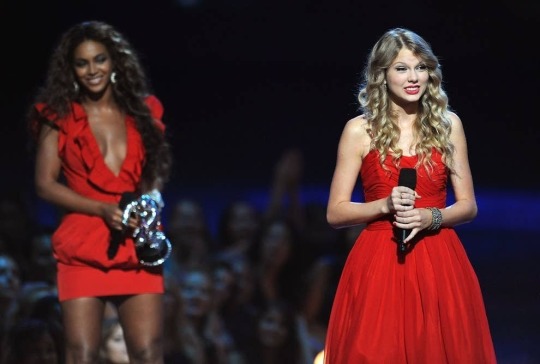
“I’m so sick of running as fast as I can,” Taylor Swift sings in the chorus of “The Man,” a song from her latest album, Lover. She chose the up-tempo tune to open her “Artist of the Decade” medley at the AMAs last month, and it’s a return to familiar Swiftian themes; she claps back at unspecified, sexist critics who fail to acknowledge her “good ideas and power moves.”
Whatever one might think of Swift’s underdog complex, it’s not surprising that the end of the 2010s finds her exhausted. Her transformation from tween country sensation to tabloid-friendly pop star to polarizing Twitter talking point and, finally, to celebrity supernova, required — at the very least — plenty of stamina.
There’s no question that straight white femininity still occupies a privileged place in the cultural landscape, which helped pave the way for Swift’s rise and decade-long pop dominance — even as she became a zeitgeisty symbol of that privilege and a target for those seeking to contest it. Yet as many of her similarly situated peers have faltered, she has endured as one of the last pop behemoths of her kind.
Time and again Swift strategically read and rode the decade’s cultural waves, deciding not just which trends and genres to jump on but, perhaps more importantly, what to pass on. As pop music became feud-centric reality television, there was Taylor; as stan culture transformed the way listeners interacted with performers (and each other), there was Taylor; as artists’ rights in the streaming era entered the conversation, there was Taylor; as politics infiltrated music, there was (sort of, eventually) Taylor.
There are definitely plenty of other contenders for Artist of the Decade (a title both the AMAs and Billboard recently bestowed on Swift) — artists who have hugely impacted pop music over the past 10 years and managed to ride out the seismic, industry-wide shifts they’ve contained, from Beyoncé to Lady Gaga to Kanye West. But you don’t have to think Swift was the “best” or even most significant artist of the decade to acknowledge that her cultural domination, and her ability to pivot and reinvent herself, captured many of the defining tensions of pop music over the last decade.
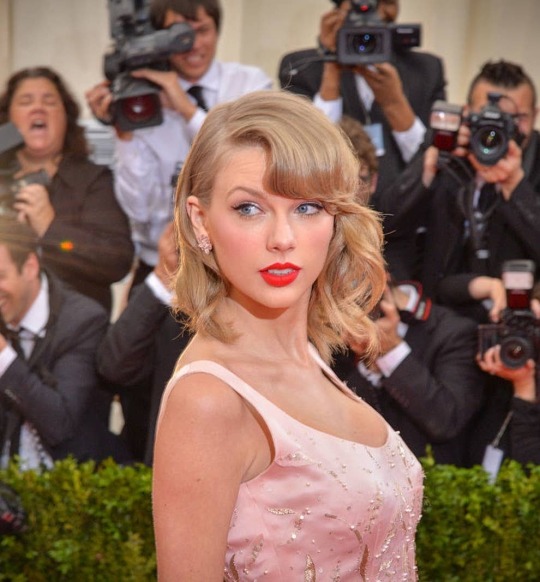
It’s hard to remember (in internet years) that before 2010, Swift was just a teen pop star and not yet a cultural lightning rod. She was already taken seriously as a musician and had plenty of cultural capital coming into the decade; in 2009, having already won Artist of the Year at the AMAs, she was about to accept a Video Music Award for Female Video of the Year when Kanye infamously interrupted her speech. In early 2010, she won Album of the Year for Fearless at the Grammy Awards, beating out Beyoncé and Lady Gaga.
Her early stardom revolved mostly around the fact that she was a precocious young country artist who wrote her own songs, without the risqué edge or sexy-but-wholesome cognitive dissonance of someone like an early Britney Spears to worry white parents and inspire pearl-clutching tabloid magazine covers. And it wasn’t really until Speak Now — when Swift was already a mainstream star but still categorized as country — that she began teasing the media and her fans about the ways her autobiographical lyrics mapped onto her real life, especially regarding the men she was dating.
People are still wondering whether Alanis Morissette’s “You Oughta Know” is about Uncle Joey, so it was startling for a young woman songwriter and musical celebrity of her commercial reach to use her songs to consistently craft such intimate stories about such equally public men, including Joe Jonas, Taylor Lautner, and John Mayer. And there was something uniquely bold about the way Swift started using her confessional songwriting and melodic sensibility to “get the last word” on her relationships, as People magazine framed it in her first cover story.
People hardly batted an eye in 2018 when Ariana Grande’s first No. 1 hit, “Thank U, Next,” literally name-checked her list of ex-boyfriends, and that’s in no small part because of Swift. Because even as reality TV stars like the Kardashians and Real Housewives were figuring out how to create multiplatform storytelling through social media, Swift was already pioneering the strategy in the big pop machine. Yes, she opportunistically used this to shame exes, create fodder for talk shows, and garner magazine covers; and even then, it raised some hackles about the way she was using her power. But it was undeniably compelling theater, and even nonfans were watching.
That multiplatform mixture of music and drama wouldn’t have succeeded without the undeniably catchy earworms Swift’s diary entries were wrapped in, or without the devoted fanbase of Swifties that she cultivated online. This all helped her break chart records with her most explicitly pop albums, including 2012’s Red and 2014’s ’80s-inspired 1989. The latter garnered the biggest first-week sales for a pop album since Britney Spears in 2002, helping Swift keep the tradition of the monocultural pop star alive.
But as Swift’s music saturated airwaves, and her willingness to tease behind-the-scenes details of her life in her songs moved beyond ex-boyfriends like Harry Styles (“Style”) into swatting at other pop stars like Katy Perry (“Bad Blood”) the public began to sour on Swift’s strategic use of her personal life in her music. (To Swift’s credit as a performer, no other pop star could sing the lyrics “Band-Aids don’t fix bullet holes” about a dispute over a backup dancer with a straight face.)
Juxtaposed with Swift’s self-celebrating “girl squad” feminism, her opportunism — and seeming hypocrisy — started to rankle. By 2015, even racist sympathizer and critic Camille Paglia came out of the woodwork to anoint Swift a “Nazi barbie,” calling out her tendency to treat friends as props. And all these contradictions of Swift’s persona would come to a head when Swift’s seemingly buried feud with Kanye came roaring back the following year.
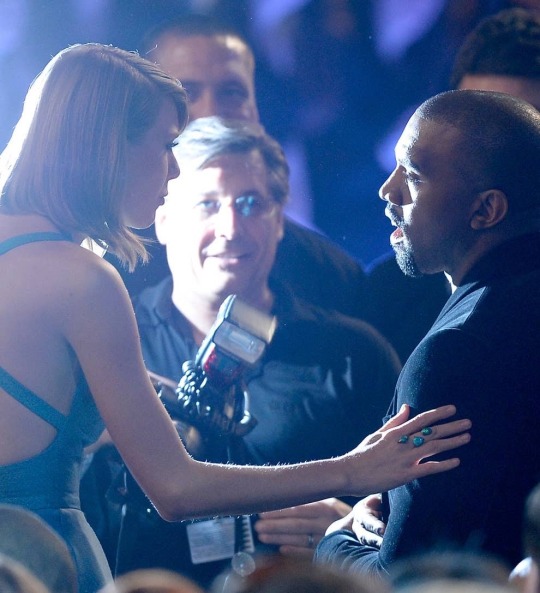
It makes sense that her clash with Kanye and Kim Kardashian West became the first time she experienced a real backlash. Unlike the drama around her dating life or with Perry, it was the first time Swift was up against equally savvy adversaries — celebrities who, like her, were professionals at merging their public and private lives.
The fight was a meta moment by design, inspired by West’s song “Famous,” where he raps: “I made that bitch famous.” In retrospect, it seems clear that West, as much a publicity-seeking pop diva as Swift, was trying to get the last word after going on an apology tour about the interruption heard round the world. Swift claimed to be annoyed over what she saw as the song’s credit-taking message, and she tried to make it part of her own narrative. “I want to say to all the young women out there,” she intoned in her speech accepting a Grammy for Album of the Year in February 2016, “there are going to be people along the way who will try to undercut your success or take credit for your accomplishments or your fame.”
In another era, Swift’s storyline might have won the day. Her publicist denied that she had approved the line in the song, despite Kanye’s claim that he had checked with her before releasing it. But celebrity narratives, to some degree, were no longer being decided just by white-dominated mainstream media. Black publications were the first to tease out the racial undertones of Swift’s lie in the ensuing “he said, she said,” specifically as a white woman playing on the ingrained sympathy and benefit of the doubt that white women are given in US culture.
Still, it wasn’t until Kim’s Snapchat leak that July — where Swift could be heard approving the song — that the Swift-as-victim narrative became a framework for understanding her entire career. Contemporary white pop stars like Grande and Miley Cyrus had faced musical appropriation backlashes, but this time it was Swift’s entire persona — not just her music — that were under scrutiny.
Swift’s memeable response to the leak — “I would very much like to be excluded from this narrative” — was followed by her own disappearance from the media landscape. By the time the 2016 election happened — amid the chatter about white women’s complicity in electing Trump — Swift’s refusal to take a political stand solidly cast her as a cultural villain, and her symbolism as an icon of toxic white womanhood was sealed.
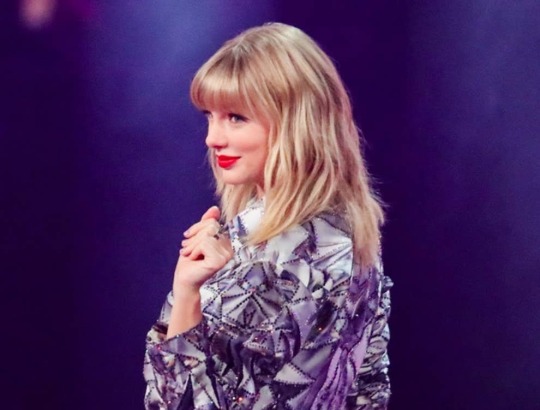
If the clamor of social media (especially Twitter) was central to the Swift backlash, it was also central to her eventual resurgence. Over the past decade, social media (especially Instagram) has tipped the scales in celebrity coverage and helped celebrities tell their stories on their own terms, almost without intermediaries. Swift knew how to use that to her advantage and decided to play the long game.
By refusing interviews for 18 months, wiping her social media clean, and focusing on cultivating her Tumblr fanbase, Swift removed herself from the cultural conversation for a beat. This kind of brand management helped her keep an ear to the ground while in a self-imposed exile. But it’s as if the culture couldn’t stop conjuring her; rumors about her absence spread, including that she had traveled around inside a suitcase.
In August 2017, she wiped her social media clean and reappeared with a snake video — reclaiming the serpent emojis — in what was ultimately the announcement for her Reputation album, and which remains one of the most iconic social media rollouts ever. “Look What You Made Me Do,” the lead single, was endlessly memed — Swift couldn’t come to the phone, a perfect metaphor for her cultural disappearance and, perhaps, a kind of ghostly remake of the Kanye call. The album succeeded because it seemed as though Swift was finally open to owning her melodrama and messiness. She subsequently broke records with the tour and album sales.
Still, her political silence was affecting her image and music. By 2018, insipid corporate wokeness had become the order of the day, and Swift Inc. again pivoted musically and culturally. Swift came out for the Democratic candidates in the 2018 midterms, framing her support in terms of LGBTQ rights and racial justice. And this year, the second single from her latest album, Lover — “You Need to Calm Down” — was a perfect encapsulation of her politics of messiness, conflating anti-gay prejudice with Twitter drama. (And somehow turning the video into a celebration of pop queens supporting each other). This fall, she has made sure to include über-stan–turned–pop star (and video coproducer) Todrick Hall at her awards show moments, attempting to expand the range of racial and sexual identities included in what used to be her mostly straight white “girl squad” feminism.
For all of Swift’s success at updating her persona, she’s never quite regained her massive radio dominance — but no pop star can depend on the success of singles for over a decade. In fact, Swift is one of the most interesting figures of the decade because her stardom is caught between the old-school era of album buying and our current streaming moment.
And, inevitably, Swift has turned her own industry issues around streaming and artistic ownership into a wider commentary on artists’ rights — which happens to work as a canny form of further brand management. She framed herself as an ethical businesswoman when she called out Apple for not paying artists, and she battled with Spotify over streaming royalties but without really pushing for wider systemic industry change.
Earlier this year, Swift started a new artist-versus-industry fight about her music masters being bought out from under her by nemesis Scooter Braun. It’s a complicated story, one that Swift has framed as being about “toxic male privilege,” and the fact that Braun mocked her during the Kanye era — once again blurring, in her trademark mode, the personal with the public and the systemic with the individual.
Instead of being seen as opportunistic, Swift seems to have succeeded in framing her campaign as a fight for unsigned and less powerful artists’ rights, which has resonated at a moment where content creators are all pitted against the 1% of the tech and corporate worlds. This time, even Rep. Alexandria Ocasio-Cortez — a squad member any star would envy — backed her up.
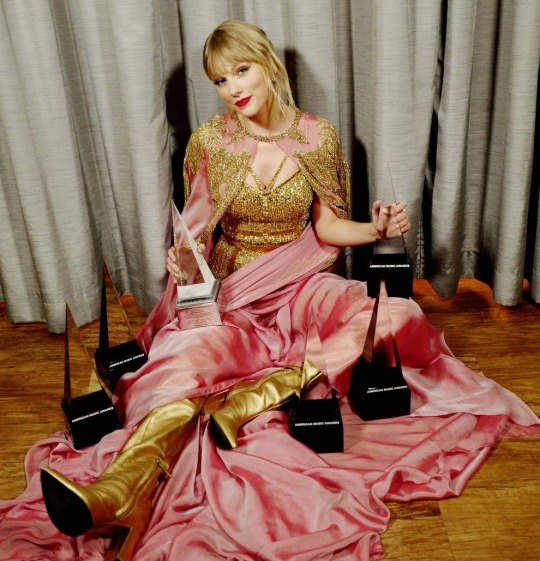
Swift’s response to being anointed Artist of the Decade by the AMAs and Billboard provides interesting insight into how she sees herself now and where she thinks the next decade is going. She chose Carole King, one of the preeminent symbols of pop music authenticity, to present her AMA, squarely placing herself in a genealogy of great women singer-songwriters. She also enlisted shiny next-gen pop stars Camila Cabello and Halsey to join her during her performance of old hits.
In her Billboard speech, Swift name-checked newer stars like Lizzo, Becky G, and Billie Eilish as the future of the industry. Tellingly, they are women who, so far, have not played into the tabloidy pop dramas that dominated the 2010s. If this decade has shown us anything, it’s that blurring public and private through music can reap big rewards, but it also opens up stars — especially the women of pop — to more intense scrutiny and a higher degree of personal accountability.
In a Billboard interview looking back on the decade, Swift spoke about her relationship to fame and learning to hold things back. “I didn’t quite know what exactly to ... share and what to protect. I think a lot of people go through that, especially in the last decade,” she said. “There was this phase where social media felt fun and casual and quirky and safe. And then it got to the point where everyone has to evaluate their relationship with social media. So I decided that the best thing I have to offer people is my music.”
Like Lana Del Rey denying she ever had a persona, or Lady Gaga stripping down with Joanne, there seems to come a point when white pop divas need to declare themselves authentic and all about the music — as if their ongoing narratives aren’t part of the show. But the way Swift used her image and the never-ending soap opera that swirled around her to make space for her music in an increasingly saturated attention economy was itself a kind of art. ●
9 notes
·
View notes
Text
Digital Challenges, 5 Predictions for 2020
New decade, new year, a new era of challenges and possibilities. It is not just for people like digital officers and technology admirers that technology plays an important role in their life. Almost everybody wonders what the future holds, especially in terms of how our life can be changed for the better by using it. This is also one of the questions of many companies who want to stay updated with the latest trends. For several years, data analytics companies struggled to motivate business owners to undergo a digital transformation in order to enter the new IT age. Those who refused or did not succeed are left behind with less revenue, employees and target audience. Although each company will have a unique transformation journey depending on their intern politics, business strategy, organization culture, and resources, each one of them has to own a deep understanding of the Digital Age.
Due to the fact, not so many owners have time to focus on big data and future predictions, there are ways of discovering business processes that need to be improved according to the technological trends in a certain industry. Data analytics companies and finance outsourcing companies are on the rise in the last decade especially because they have resources, experts and knowledge to help companies like yours to get insights into all the important information for their business. Using business process outsourcing can benefit your business in many ways, but mostly in boosting your business growth. What a lovely way of starting a new 2020.
Businesses that are considered digital enterprises are the ones that are data-driven so it helps them to stay focused on customer satisfaction. Entering an IT era brings lots of challenges to the company, and if she is not ready to solve them, it can negatively influence its business. So what are some of the challenges that we will face in 2020?
#1 Say hello to 5G
5G telecommunication will go mainstream in many areas and will bring new advancements, faster speed, and reliable network to many cities and metropolitan areas. It will accelerate the industry growth and the establishment of the real smart cities, and smart manufacturing. Moreover, it will dramatically change how we use the internet, new business ideas and how we handle the customers.
#2 Advanced analytics will become a core of every successful business strategy
Companies that thrive on change use data analytics companies to stay ahead of their competitors. Data, if used as a competitive asset, bring more clients, opportunities and new business relations and cooperations to the company. Those that successfully use data are improving their productivity, competitive advantage, and customer satisfaction while at the same time reducing the cost and making mistakes. Data will mean everything in the next decade, and 2020 is just the beginning of the much greater challenges that wait for us in the future.
#3 AI and machine learning as the next company’s asset
In order to survive challenges in the modern age, companies will have to adopt AI and machine learning processes into their organization. By 2025, AI-driven business entities will be more efficient and productive than traditional enterprises. Moreover, they will spread twice the market share so it has become a matter of survival too. Even the toughest ones cannot continue to ignore the technological innovations because the markets are changing and so is the core of every successful sale, and those are customers. If you refuse to change, your clients won’t and you will stay with a great deal of your target audience.
#4 Digitalization of customer contacts
More and more people will interact with each other in the next decade. That means an increase in communication between customers and companies. Despite thinking that AI will replace us, the human touch will become almost the most important product a company can offer to its clients. Deploying agents to improve customer contact is something you should consider if you want to boost your business stability and growth. Contact center outsourcing services are rapidly growing in the age where customer experience journey and satisfaction are among the top three reasons for the popularity of a product or a company. Using a top-notch contact center outsourcing company can create an environment where tasks are being solved more effectively and successfully. Companies should not underestimate the power of multi channeling with their target audience and current clients. Only then will you stay ahead of your competitors.
#5 The evolution of transformation
Transformation and related services will become a wanted experience for the enterprises. Many companies desire to change but do not know where to seek help. The challenge of transformation is so complex that most of them just give up and hope for the best. Nowadays you can find quality data analytics companies and finance outsourcing companies who can help you with the process, and more and more similar companies start to offer transformation as a service. The future will center around humans but they will hold an important role in the digitalization of the world. Get familiar with the digital challenges and seek help from the experts who will catapult you to the top of your industry.
Saks has years of experience in providing data and business process management services to companies around the globe. If you want to understand the world better, contact us for more information on how we can help you to transform your business and bring you more satisfied customers. In the age where digital and human touch intertwined, get a helping hand from the professionals who understand the processes that support a successful, prominent and stable company.
1 note
·
View note
Text
Best Dick Jokes Through History – Why Sexual Comedy About Men Is Important – Esquire
Blake Griffin landed a dick joke about Caitlyn Jenner at the Comedy Central Roast of Alex Baldwin, which aired last weekend. “Caitlyn completed her gender reassignment in 2017, finally confirming that no one in that family wants a white dick,” he said to roars of laughter. Was the joke offensive? Racist? Hilarious? All of the above? For her part, Jenner took the dick joke in stride. “Caitlyn was down for it,” one of the writers of the roast said. “She was like, ‘Well, you know, I’m gonna hit hard. I want them to hit me hard.’ And so we did.”
Dick jokes have existed throughout history in nearly every culture known to man, from the greatest literature of all time—Shakespeare and James Joyce—to ancient graffiti. “Weep, you girls. My penis has given you up. Now it penetrates men’s behinds. Goodbye, wondrous femininity!” some anonymous guy scrawled on the wall of a bar in the Roman city of Pompeii around 2,000 years ago. They have been staples of comedy for millennia for a reason: They’re nearly universally appealing.
“Whether you’re rich or poor or black or white, everyone laughs at a dick joke,” says comedian Aaron Berg, who hosts a recurring show at The Stand in New York City. (Berg also hosted a somewhat controversial, entirely satirical show called White Guys Matter that addressed some aspects of white male inadequacy.)
One comedian has elevated dick jokes to poetry, launching them into the realm of high art: Jacqueline Novak, whose one-woman off-Broadway show about blow jobs, Get on Your Knees, manages to make the dick joke both hilarious and high brow. She’s not the first woman to tell a dick joke, nor will she be the last, but she is perhaps the only one to devote a show almost entirely to the penis (with a few minutes sidetracking to ghosts) and be feted by The New York Times for doing so.
Novak, who has been called a “deeply philosophical urologist,” may represent a tipping point in dick jokes, because her show is finally allowing people to see the wisdom (yes, wisdom) in penis humor.
“I don’t even think of myself as like, interested in telling penis jokes. I certainly wouldn’t sit down and go, I’d love to do a show about penises,” Novak says. “I think it’s more like an investigation of my heterosexuality. Does [being heterosexual] mean I love the penis? I’m interested in the language that I’ve been expected to use or accept as legitimate about the penis. Here’s all the reasons that that’s ridiculous.”
Novak’s show is replete with riffs on our “ridiculous” penis language, from the fact that we say the penis is “rock hard”—”No geologist would ever say, this quartz is penis hard“—to the idea that the penis penetrates a woman—”You penetrate me? Fine, but I ate you, motherfucker! I chewed you up! Spit you out, and you loved every goddamn second of it.” In some ways, Novak is the perfect teller of the 21st century dick joke, not only because she is chronicling our hangups about the penis, but also because without a penis of her own, perhaps she is able to see the dick more clearly for what it is, in all its ridiculousness and beauty.
“You penetrate me? Fine, but I ate you, motherfucker! I chewed you up!”
But for the most part, phallic culture remains incoherent. Men are pilloried for exposing their dicks, while Euphoria is celebrated for its 30-penis episode; dick pics are critiqued like Picassos or seen as a public menace; judging a man by the size of his penis is perfectly acceptable or grossly objectifying; porn covers every inch of the internet, yet Facebook won’t accept ads for dildos. Dick jokes are still looked down on as cheap—to be fair, some of them are blatantly bad—but some comics say that isn’t always fair.
“Dick jokes, if you craft something amazing out of them, could be the funniest thing someone’s ever heard. And funny in a way that like, opens your mind up even,” says comedian Sean Patton. “That’s the most important kind of comedy, where you laugh at something to the point where you’re now a little more accepting of it. And that can range from anything to other people’s sexual orientation to accepting your own mental illness.” Patton’s own extended dick joke, “Cumin” on Comedy Central’s This Is Not Happening, has been viewed over 2 million times on YouTube.
Jacqueline Novak performs at the 2019 Clusterfest in June.
Jeff KravitzGetty Images
Novak uses the blow job to critique cultural expectations of masculinity and the pressure women feel to become skilled at sexually pleasing men. “The teeth shaming starts early, of course,” she says in her show. “If you have your full set of teeth…don’t go into a room where a penis is. It’s not safe for him. Why would you put him at risk?”
Patton likens the dick joke to a “Trojan horse” of comedy. “You make them laugh hard at dick jokes, now they’re listening,” he says. “Then you can throw in something a little more meaningful, and they’re on board.”
Not that all dick jokes need to be intellectual to be taken seriously. The song “D*** in a Box” by The Lonely Island, featuring Justin Timberlake, won an Emmy. It turns out the concept wasn’t exactly new. “Decades before The Lonely Island, B.S. Pully was doing that in the ’40s and ’50s,” comedy historian Kliph Nesteroff says. “Pully would be holding a cigar box at his groin, walking down the aisle. [He would] start a show saying, ‘Cigar, would you like a cigar?’ Then he would lift up the lid, and there was a hole cut in there, and his dick was hanging out. The audience would go crazy.”
Dick jokes continue to thrive off audience reactions, according to several comedians I talked to. Bonnie McFarlane, who is best known for her appearance on Last Comic Standing and her Netflix documentary Women Aren’t Funny, began telling dick jokes when she started out in 1995. “You tell dick jokes because it’s a very male audience, so that’s what they want to hear about,” she says. “It’s been a thing since comedy started. People can really kill if they’re just doing dick jokes.” But there is a double standard, she says, when female comics are made fun of “for talking about their vaginas too much.”
That Novak, a female comic, is revolutionizing the dick joke makes sense, considering that historically, “the vanguard for so-called dick jokes and sexual material comes first and foremost from women rather than men,” Nesteroff says. He points to female comics Rusty Warren, Belle Barth, Pearl Williams, and LaWanda Page as “probably the four quote-unquote ‘dirtiest’ comedians of the ’50s and ’60s, more so than Lenny Bruce, more so than Redd Foxx.”
LaWanda Page performs for The Dean Martin Celebrity Roast in 1978.
NBCGetty Images
He also says African Americans pushed dick jokes further than any other ethnicity. African-American comedian Page’s albums from the 1970s were rich with dick jokes, referencing “the size of the man, the endurance of the man,” Nesteroff says. As Page recites in her 1973 comedy album Pipe Layin’ Dan: “Husband, dear husband, now don’t be a fool/you’ve worked on the night shift ’til you’ve ruined your tool/you’d better go hungry the rest of your life/than to bring home a pecker so soft to your wife.”
“LaWanda [told] dick jokes for the same reasons a lot of black comics do, because they had to come up in the chitlin circuit, which is basically comedy clubs or bars or places where only black audiences mainly go,” says comedian Harris Stanton, who has toured with Tracy Morgan. “When I started comedy [in 1999] I started in the chitlin circuit,” he continues. “Urban comedy became this big explosion in the United States. A lot of the young black comics couldn’t get into a lot of mainstream clubs, so they would have to perform wherever they could, and dick jokes were welcome to those places.”
African Americans were pioneers of the dick joke, but they definitely weren’t the only ethnic group telling them. Three of the other female sex-joke pioneers Nesteroff mentioned were Jewish. Pearl Williams was known for roasting overweight men when they entered the comedy club by asking, “How long has it been since you’ve seen your dick?” Lenny Bruce, one of the most famous Jewish comedians, was arrested for saying schmuck on stage in 1962. Seven years later, another famous American Jew, Philip Roth, published Portnoy’s Complaint, which is essentially a 274-page dick joke, or so some claim.
“How long has it been since you’ve seen your dick?”
“I probably owe a debt to Philip Roth that I’m not even fully aware of,” says Novak, who is Jewish. She references him directly in her show, joking, “I went off to college feeling good. It’s a Catholic-ish college. Lots of virgin boys scurrying around, scrambling for sexual experience at parties. Not me. I’m a Jew and I did the coursework in high school, so I felt like a Philip Roth figure. A Jewish pervert ready to teach.”
Jewish male comics may be drawn to dick jokes, according to Berg, who is Jewish, because, “the fact that our penises were intruded upon at a very young age probably gives us a fixation on it and makes us want to talk about it more.”
Dr. Jeremy Dauber, the Atran professor of Yiddish language, literature, and culture at Columbia University and author of Jewish Comedy, traces Jewish dick jokes all the way back to the Bible. The earliest case of laughter in Jewish tradition is Sarah’s laughter when she’s told that her 100-year-old husband Abraham will give her a child. It is “a laughter about male impotence,” Dauber says.
But comedians aren’t just laughing at penises anymore. Novak is going in the opposite direction. “I’m trying to restore [the penis] to true dignity.” Will her intellectual blow job jokes allow the dick joke to be taken more seriously? Will future comedians have to deal with the flack that Patton still gets in his reviews?
“Even like positive reviews, sometimes they’ll still point out there’s also a lot of cock, cock cock,” he says. “Why do you have to make sure everyone knows that you thought some of the subject matter was lowbrow?” He thinks reviewers roll their eyes at his dick talk because “everyone constantly is terrified that those around them don’t think that they’re that smart.”
Comedy is one of the only art forms that allows us to talk about male genitalia so openly and democratically. Whatever form the dick joke takes, from idiotic to intellectual, from poetry to prop comedy, as long as it gets a laugh, it should be celebrated. And there’s no better way to diffuse the angst surrounding the modern-day penis than a well-crafted dick joke. The more we laugh about penises (and not just at them), the happier the world might be.
Hallie Lieberman Hallie Lieberman is a sex historian and journalist, and the author of “Buzz: A Stimulating History of the Sex Toy.”
Let’s block ads! (Why?)
Source link
Bài viết Best Dick Jokes Through History – Why Sexual Comedy About Men Is Important – Esquire đã xuất hiện đầu tiên vào ngày Funface.
from Funface https://funface.net/best-jokes/best-dick-jokes-through-history-why-sexual-comedy-about-men-is-important-esquire/
4 notes
·
View notes
Photo
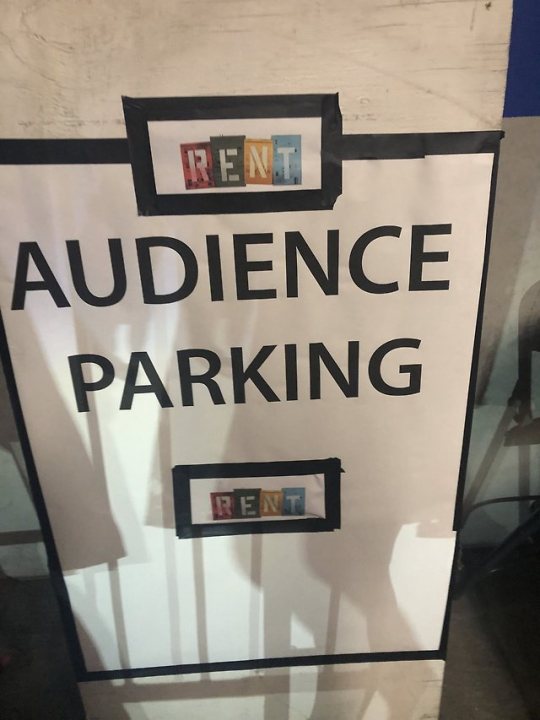
Earlier @fourteenacross wrote this post about our experience of getting to see the dress rehearsal for Rent Live (which I guess turns out to mostly mean that we saw the actual performance of Rent Not-Live) and I wrote this mess of feelings about my 20 year history with Rent the musical as well as the online and IRL community surrounding the musical. I’m depositing it here beneath a cut. (If you’re friends with me on Facebook: it’s the same thing I posted there.)
I've lost count of how many times I've had to awkwardly explain to someone, "I used to be into the musical Rent. No, like….REALLY into it?" Just in case I've never had to explain it to you: I used to be REALLY into the musical Rent. My junior high school chorus sang "Seasons of Love;" I adored it and eventually purchased the 2-disc CD set at Best Buy. I listened to it, oh, let's say 525,600 times. I convinced my mom to take me to see the tour for my 14th birthday. In Green Bay, Wisconsin, a 6-hour drive from our home. I loved it; I spent hours hogging our dialup internet connection to talk about the show with strangers. My friends at school didn't get the obsession. I'm not entirely sure I get the obsession; I was a 14-year-old straight cis white girl from the Midwest hung up on mostly-queer starving artists in New York. (I note this because I know for a lot of Rent fans, part of the excitement was seeing themselves represented in a way that they weren’t often repsented in the media in general/musical theater in specific; I know that wasn’t my situation.) The closest I can come to identifying the source of my obsession might be the line "connection in an isolating age." Loving Rent brought me into a whole community of people who, in some way or another, didn't quite fit in a lot of places. I met new friends waiting overnight in rush ticket lines to see the tour (bless my parents for indulging my quest to sleep outside of every theater in the Midwest; I think my mom in particular understood that something about this was giving me a place to fit in).
But mostly I talked to my Rent friends online. We talked about the musical, our favorite songs and actors and characters, but we also talked about our lives. At first I was one of the younger ones on the boards and mailing lists, and in retrospect I'm pretty sure I was a monster, but I felt so empowered to talk to cool adults who were like, IN COLLEGE and stuff. I learned about their lives and what was possible outside of my rural hometown.
As I got older, I grew apart from Rent. I stopped listening to the cast recording so much, then entirely. I got embarrassed about how obsessed I'd been. I knew the general consensus was that Rent was cheesy and overwrought. Ha ha, yes, of course, Mark and Roger should just get jobs. Benny's just trying to follow his dreams of real estate ownership. Ha, right, what even IS a "season of love"?
Then in 2009, my best friend Megan, who I'd met through Rent--who co-ran a Rent website with me, who waited in Rent lines with me, who had simply the stupidest inside jokes in the world with me….died suddenly. I was devastated, obviously, and for a long time after that, Rent was just ruined for me, simply too emotionally overwhelming on every level. Some department store started using "Seasons of Love" in their commercials and it was like a kick in the face every time I heard even a few seconds of it.
In 2012 I took a trip to New York and decided to go see the Off-Broadway production of Rent. I went by myself and wasn't sure what to expect--I knew the staging was different from what I was familiar with. I honestly don't remember a fucking thing about that production except that I cried for pretty much two hours straight, at varying levels of intensity, from the very first opening note through the finale. It was emotionally overwhelming and really just a reboot to my system.
2016 marked the TWENTY YEAR anniversary of Rent, and with it, a new tour. I saw it in 2017 with another dear friend I'd made through Rent fandom. Again: I remember nothing of this experience except crying. Well--and talking to people in the lobby while waiting for lotto to be drawn; other people with very fond memories of having seen Rent years and years ago, people who remembered the message boards and the drama.
Last year, they announced one of the upcoming live TV musicals would be Rent. "That's wild," I thought. Rent was now mainstream enough to be broadcast on network television, like Grease. But hey--I'd watch it.
At the beginning of this year--2019, 10 years (5,256,000 minutes) since Megan died--I saw a posting for an online raffle to win a trip to see the dress rehearsal for Rent Live. I entered it of course, not thinking anything of it.
And then 2 weeks ago I got an apparently legit email--I'd WON this drawing. It didn't seem possible--so many people must have entered, how on earth would I win? (Like: I'm not saying that the ghost/angel of my Rent-obsessed best friend somehow rigged this online contest for me, but I can't prove that she DIDN'T.)
The rules of the contest didn't allow me to publicly announce it, and I was scared to talk about it anyway because I was not fully convinced that it was real. Still, I asked Kait, one of my other best friends--who I also met because of Rent, twenty years ago, and who remains a hugely integral part of my life to this day--if she'd want to be my guest on this trip, proving it turned out to be real.
It was real. We went. I felt very stressed and uncertain about it all, but on Saturday, January 26th we turned up at Fox Studios and they accepted my paperwork and gave us paper wristbands and made us wait in a long line and eventually? They let us sit down on chairs in a big studio, and some actors performed Rent in that studio. It was an amazing experience; there were 1300 other fans in there with us, all so excited to see this show that must have meant something to us--it wasn't easy to get tickets to be there, everyone there wanted to be there. While we were waiting for the show, all around us we heard people reminiscing about seeing it on Broadway, meeting the cast, hating the movie version.
There were changes made to the script and staging--of course we noticed, of course we all of us had the entire full text of the original show preserved in amber in our brains. For the most part, I didn't mind--most of the changes I thought were good, or at least okay. A few annoyed me but mostly...it was Rent! I cried, of course, the minute the lights went up and Mark began his familiar monologue. Eventually I stopped crying and I laughed and screamed and just enjoyed the songs; enough time had passed that I could experience the show in a new way. It felt like coming home.
(Years on Broadway message boards have made me aware of how unprepared I am to actually discuss theatrical performances; I don't know musical or theatrical terms, I can't tell if things are off-key unless it's very drastic. I am overall a very forgiving audience member; I want to like shows and performers and generally I do, though of course sometimes I have critiques. As I type this it's been a day since Rent "Live"--which turned out to mostly actually be the dress rehearsal that I saw, due to Brennin Hunt's injury--and plenty of people have plenty to say about how low energy it was, how so and so couldn't hit the appropriate notes...and I don't know about any of that. I just know that when I was there, watching it, I felt every moment and fell in love with every character, even though yeah they should totally try to get actual jobs or whatever.)
And then--we'd already known, from the internet, from some of our old Rent friends, that the Original Broadway cast was there that night too. We suspected they'd make an appearance for us; surely they wouldn't be there just to observe. And indeed...after the finale, they bounded out on stage and sang a reprise of "Seasons of Love." If that had happened to me when I was 16, I think I might have literally passed out. I'd listened to them on the cast recording so so many times, but of course they'd all left the show by 1999, when I got into Rent. (I've been lucky enough to see original actors in other projects since then, but not Rent.) Seeing them, hearing them...honestly I felt like I had full-on Beatlemania, I was literally shaking. I couldn't believe I was so lucky to see that and hear that and feel that.
And then the next day, I got home from LA in time to watch 2/3 of the show on TV. I livetweeted it and chatted in a group chat with a bunch of my Rent friends, people from all around the country. And that's what Rent is about, really--it's about the power and importance of community, and I'm so grateful to be a part of this one. #CompulsiveBowlers #FriendshipIsThickerThanBlood #NDBT
Anyway that's why I was in LA last weekend.
14 notes
·
View notes
Text
Why do America’s generations keep getting dumber?
America is the global symbol of individual liberty and opportunity. Defined by capitalism and democracy, the very concepts that have made the U.S. the hallmark in innovative thinking and societal development. With arguably the best ‘system’ in the world able to work at great scale, American renegades have been the frontrunners in many aspects of society many countries wish they could compete with. Walt Disney, Bill Gates, Steve Jobs, Mark Zuckerberg, all American icons for creative thinking and execution. Creative, intelligent men that any company would love to have on their team if they could convince them to come. They’ve accomplished things that some would believe to be impossible, and not only that, they all dropped out of college. The education system failed them.
The current American educational system was first introduced in the 1910′s during the industrial era to create a scaled up version of a youth knowledge assembly line. Children are crammed into large classrooms and are taught general knowledge to enter the next level of education. The strict regimen of be quiet, listen, and regurgitate what you have heard onto a standardized exam to get a letter grade has been used for over a century. This practice is nowhere near teaching a child to think and solve problems. Tests do not work. They do not represent any more than words on a paper. Example, the Chinese Box Experiment. In short, a Chinese professor inserts a test of different Mandarin characters that a robot on the other side of the door must answer. The robot identified every character correctly and returned the paper. The Professor says “Wow, this pupil understands Mandarin very well!”. She is unaware the answers came from a machine programmed by humans. The robot does not actually understand what is going on, it is simply responding with what it’s been told to do. Understanding is using memory to create predictions. However, this is exactly how school teaches children in America. They program children to respond to an input with a correct output, and those that compute such information correctly, are deemed the brightest. If we are programming children to act as robots, robots will win every time, bar none. The only way to fundamentally beat a robot is to be more human. Humans have creativity, emotional intelligence, morals, historical and societal awareness. Schools are essentially building kids like robots in an assembly line. They are writing code in our brains on how to think, act, and behave in many situations. The smartest natural child can be nurtured in such an environment to become average.
The most beautiful aspect of a child is its sense of curiosity and creativity. Left to its own, many will fantasize about spaceships and rockets and trains. They will dance on couches, spill their parent’s coffee on the rug, They ask naive questions about complex issues. I was lucky enough as a child as my father would make me understand how any toy or tool worked when I used it. I was made to inquire about the world around me. How does a car engine work? What could make it better? Why do planes not fall from the sky? I was then sent to day school and would be told to shut up and listen to the teacher, because he is smarter than you. What does it mean to be smart then? To know more information and algorithms downloaded into the hippocampus? Memory is not intelligence. Intelligence and consciousness are manifested in the neocortex. The part of the brain that operates high level thought. Children in American society are suppressed and told to remember things to graduate. After a certain point of indoctrinated thinking, children lose their sense of curiosity and are more focused on execution then the process of learning and solving the problem itself. The most commonly asked question in American schools is “Will this be on the test next week?”.
So how can we make this better? This epidemic starts on the very system of education itself. The end goal of school is to obtain a degree, a rough representation of what college taught you, or maybe you were just wily enough to cheat (which is highly incentivized in the ends justify the means environment.). School’s are not obligated to innovate. Colleges are businesses. They force 18 year old children to take on 200 thousand dollar debt decisions. They don't need all that money. The books that cost hundreds of dollars for students, cost 6$ to make. NO INDUSTRY IN THE WORLD HAS A MONOPOLY THAT BOASTS SUCH GREAT PROFIT MARGINS. Colleges have young generations on a string with the rhetoric that a degree is worth such money. Millions of kids cry joyfully over getting into a school, just to give them money that is taken from loans to enslave them once they get out with a degree. College is enslavement. It is a monopolistic business. It is a shame to see such an important factor to human development being exploited for profit. They pay zero taxes on the profits they make. They teach general knowledge in a lecture style. Is that worth it? Why do kids want this? Why do parents make them do this? Because they did it when they were kids? We are in a new age.
Fast forward over a century later, the digital age. Children have smartphones, smartphones with all the information they need. Why sit in a room listening to someone lecture when you can just look something up? Children are put in classrooms that are part of a school, that are part of a district, that is part of a school board. These scaled up versions of education pump out millions of children with a broad range of general knowledge, or at least that is the intent. Now most of these kids go to college, work a 9-5 job, and start a family and the cycle goes on with their children. That is not fulfillment, that is not happiness for most. The average school tuition has increased by more than 200% while the average salary of college graduates has plateaued since the start of mass schooling. We live in an era of economies of “unscale”. With artificial intelligence and cloud computing, vertically integrated corporations with huge factories and inventory cannot compete with lean, agile startups that rent cloud storage on Amazon Web Services, outsource manufacturing to Chinese factories, and utilize open source Machine Learning algorithms instead of spending great capital to build it all individually. This gives power to creative, niche startups that can effectively run a business from their basement. Think back to the 1990′s. The internet had just gone mainstream, thousands of employees quit their jobs to create internet companies during the Dot-Com Boom before it crashed. They would plan their IPO before even incorporating, this new technology was a home run in their eyes. How does this relate to education? The rapid evolution of technology can be attributed to new platforms. Telecommunications created a global platform for information to be spread from Boston to Australia in an instant, the internet has revolutionized virtually every industry. My generation is growing up in the advent of the AI and cloud computing platform. Essentially, the innovation of big tech platforms should equate to radically different education. However, because school systems have no incentive to change and make less profit, they are still preparing kids for an industrial era to be interchangeable pieces working for large corporations rather than agile startups and small to medium companies.
Artificial Intelligence will radically change education. Harvard, Stanford, and a few other large brand schools have noticed this trend and created online courses already that use machine learning engines to tailor a course to a students understanding. AI can use big data to understand how a pupil learns, what he/she is struggling in, and create a report on their level of thought that is a perfect representation on what they can do, rather than a vague degree. Many companies such as Microsoft and Google are receptive to this and an increasing number of developers enter the software field with no degrees. Because there is no system that could exemplify a student’s intelligence in the past, an expensive degree was the next best thing and college became a booming business but quite an enslaving process for the children utilizing it. AI can guide a student while virtual classrooms and teachers can connect to children across the globe for real organic conversation. Now, the physical classroom is very important for social development and should still be used to an extent. Perhaps we Americans should look towards Finland, the country with the best ranked educational system in the world. Their primary and secondary schools are incredibly different. School days are 3 hours long, there is no homework, and there are no private schools. The philosophy is that kids should be emancipated from the institutions and be left to be kids and develop intuitiveness organically through real world social experiences. There are no private schools so that rich families send their kids to public schools and those parents make sure the school is up to par with what they can afford.This forces schools nationwide to keep a standard that is universal, much unlike the U.S. with many inner city public schools without internet while capitalistic private and public district schools spend money on football field renovations.
To create a more productive generation of students, we must “unscale” education, remove private schools, reduce length of school hours, ban or at least regulate student loan firms, set a price ceiling on all college tuitions and utilize the platform of Artificial Intelligence to create a market of one for all students starting from Kindergarten to beyond college. Hiring more teachers and building would effectively make the problem worse. Teachers can be the greatest minds on the planet, but under such a restrictive there is little hope to save a whole generation. Khan Academy has implemented an unscaled online system, leading the way for more personalized education programs. There is little chance this can happen unless this is derived from the Federal Government, which is famously bureaucratic and slow to act especially with education. Changes are needed. This will make children more excited to learn, ask questions and solve the great global issues that are long overdue to be solved. Kids will strengthen critical thinking skills and experience freedom of thought that will create a wave of further technological development and accelerate American education to new heights.
2 notes
·
View notes
Text
Critical Thinking is Hard
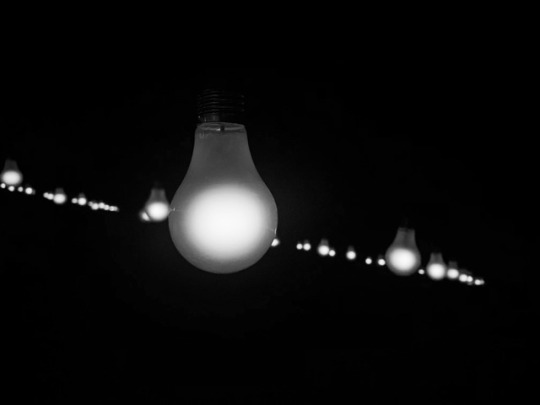
I’m lucky: I grew up in a family where thinking was encouraged. My parents treated me and my brother like we were brilliant, which makes you want to be brilliant, and come up with your own ideas. They liked to talk about stuff, and, while they definitely treated us like kids, they also didn’t really shelter us too much. My mother was always ruining TV shows for me by pointing out the sexist moments in television, from reruns of The Brady Bunch and Star Trek, to Charlie’s Angels, Three’s Company and, well, it was the 70s and 80s, so pretty much all TV shows. But they still let us watch them, as well as R-rated movies which may not have been age-appropriate, and while they told us not to smoke pot, when we found out that they smoked pot, they gave us reasons for why it was okay for them and not us (since they “weren’t going to have any more children,” which seemed to make sense at the time). Another thing they did was encourage us to take responsibility for our own decisions from a fairly young age, which meant that you could stay up until 10 or 11 pm on a school night if you really wanted to, but it’d be your fault when you felt like shit all the next day. One can debate the pros and cons of this method of child-rearing (pro: de-mystifying drug use and other taboo behaviors to the degree that they actually start to seem uncool; encouraging kids to develop strong ethical compass and think through their actions; con: kids are even more weird compared to their peers, and precociously develop anxiety and guilt about their own actions). Nevertheless, it did start me on the road to learning the value of thinking for myself.
I didn’t really come into my own as a critical thinker until junior high, however, when I spent two years in a program for gifted students. First, isolation from my peers at a time when I was supposed to be learning the social skills of adulthood and the bullying that naturally flowed from that taught me to look for other people’s faults as a means of self-defense. That made me critical, if not necessarily thoughtful. But then I also had two years of Mr. Snyder teaching me social studies. Many of us in the gifted program had all of the same teachers for all of our academic subjects two years running. This meant that we got to know those teachers really well, and, in the case of Mr. Snyder, came to greatly admire and be shaped by his worldview. Mr. Snyder wasn’t an obvious candidate for intellectual guru to early adolescents. He wasn’t particularly handsome, and he’d had polio as a child and walked with a prominent limp. But he was funny and charismatic, gave terrific lectures that were like brilliant comedy monologues or TED talks, and knew how to make his students feel smart and special — in part because we had made it into his class, but still. We liked him so much that several of us would get to class early every day so that we could draw cartoons of him on the blackboard with clever word bubble-jokes, and he loved that. Too see him come into the room and look at our clever depictions of him and smile and make jokes right back at us, to feel appreciated for our intelligence and creativity, a sensation could be hard to come by as a suburban New Jersey youngster, was wonderful. The class was a mutual admiration society and a bit of a cult of personality that I think hugely affected all of us who took it.
I learned a lot there, as we studied political systems, geography and the history of the ancient world, among other things. We were assigned projects that were unlike anything you’d typically get in junior high or even high school, a combination of fun, self-driven exploration, and out-of-control amounts of work. We had to make a map of the world that included every single country, city, major mountain range and body of water, using color-coded overlays — something that I would have enjoyed, and sort of did, except that, since I was in 7th grade, I was terrible at judging how long it would take and left it until the last minute, and had to repeatedly re-letter the smudged plastic to make it readable in my 12-year-old handwriting. The following year, when we did separate units on Greece and Rome, we had to either fill in an entire outline that he provided with a paragraph or more on every subject, or do a handful of more creative projects designed to help us probe the topics in more interesting detail. After choosing to do the outline for Greece, thinking it would be easier, and ending up with several pounds of handwritten paper (I could not type) on everything from Sparta to Socrates to Doric columns that was probably 75+ pages long, Mr. Snyder had stared at the pile and admitted to me that he hadn’t really expected anyone to choose that option, that he’d made the outline so absurdly long to encourage people to do the creative projects. I probably got an A more because he didn’t want to read the whole damn thing than anything else, and on Rome, I did the projects, like going to a Roman-Catholic service and writing about it — which I did by interviewing my Catholic friend, Tara, instead of actually going to the service myself — or going to the Met to observe and then expound upon the differences one observed between the Greek and Roman statues — which I did after 15 minutes of taking furious notes on a Sunday when we arrived just as they were getting ready to close. Just because I loved Mr. Snyder didn’t mean that I, like any other kid, wasn’t always trying to get out of doing homework in any way I could.
The thing I learned and remember best, however, was not the facts, but the method. We had a class about political and economic systems — communism, socialism, capitalism, authoritarianism — and the first thing Mr. Snyder did was define these terms for us, explaining that they weren’t what we’d been told they were. Specifically, “communism,” the way it was looked at in the budding Reagan Era of the early 1980s, wasn’t actually communism at all. Real communism was an economic system that someone named Karl Marx had come up with, in which everyone owned everything, nobody was rich or poor or more powerful than anyone else, and that was, in fact, kind of the opposite of what the Soviet Union had become. This somewhat blew my mind. Here was the boogeyman that everyone talked about as the great evil threatening us with destruction — and remember, in the world of an American kid who had trouble sleeping at night because she obsessed with how we were one button push away from nuclear war, that meant genuine annihilation — and it wasn’t even what it really was. How was this possible? How was everything that we saw on TV and in the newspapers and at the movies just plain wrong? It turned out that, once you delved into it, the evolution of the term “communism” in the popular vernacular was an education in how concepts entered the public consciousness and then were propagated endlessly in the echo chamber of the media and society until they became something else entirely, usually in the service of some political or social end. Sound familiar? It wasn’t the same then as it is now that we have the Wild West known as the Internet, in some ways it was easier to get an entire culture to basically think one incorrect thing rather than many insane things, but the ability to miseducate a huge swath a people without their questioning it? Yes, that existed, and understanding that was a very big deal to me. It meant that you always had to look deeper than the surface of things to be sure you understood the reality, even when it came to what those things were called.
Why doesn’t everyone get taught to think this way? Well, like most things in life, it gets increasingly harder to learn as you get older. The more set in our ways we get, the tougher it becomes to look at ourselves critically (which is essential to critical thinking, because to truly get that you must dissect and assess the viability of ideas, you have to start with your own assumptions), much less change the way our brains function in terms of adopting new ways of doing anything that’s really embedded in there, much less ways of doing everything, which is kind what it means to change the way you think. Plus, it’s in the best interest of those in power to keep the bulk of the human race from doing it. It’s tough to build an army of people who don’t automatically follow orders, or have a religion made up of people who are always questioning the word of God, or build a movement if the followers are continually asking the leaders, “Is that really true?” And so we’ve arrived at this situation where we have so much information out there now to make sense out of, and the bulk of us without the tools to figure out how to do that — and many who reject those tools because they’re told education is just liberal elite brainwashing. Instead, you see a lot of people turn to a kind of twisted, easy version of “critical” “thinking” espoused on the fringes of the left and right, which disposes with the thinking part and instead just espouses wholesale rejection of anything dubbed “establishment” or “mainstream,” no matter how awful the alternative may be (and at this point we know: it’s pretty awful). Add to that the folks who skillfully exploit the overwhelm of information and lack of analytical skills to support their own greed, lust for power and desire to win at all cost, and you end up with an awesome new and different kind of embedded orthodoxy, that encourages us to silo ourselves within “our” (really their) belief systems, walled in with “alternative facts” and media that support them, and defending it all tooth and nail with false equivalencies that encourage us not to critique thoughtfully based on evidence, but to to pick apart every idea that doesn’t fit or even makes us uncomfortable (“Well, every politician lies” was one of the most egregious ones I heard used recently to defend the president).
And, when it comes right down to it, can you blame people? Thinking is exhausting, especially in this environment, and even human beings with the best intentions manage to ruin everything good anyway. Like, even though my parents didn’t make us believe their ideas, of course they still managed to inculcate in us their most mundane opinions. My father was particularly good at doing this, particularly when it came to eating (yup, Jews), like how fast food and chain restaurants should be avoided not based on nutrition but on lack of flavor (which I guess is why we still ate at White Castle), or how chocolate was really the only kind of acceptable dessert. It’s amazing that, no matter how far I’ve come as an adult, I still find it really hard to shake these ideas — like I saw a conversation on Facebook about how pie was superior to cake, and I just thought, Huh? But there aren’t any good chocolate pies. Another case in point: by the time I was a senior, Mr. Snyder had moved up to the high school, and was teaching an AP history class that I had the option to take. I decided to take economics instead, because I had never studied it, because one of my best friends was taking it, and, on some level I’m sure, to show that I didn’t need the wisdom of this idol of my 7th and 8th grade self, now that I was all of 16. I heard from people who took Snyder’s class that in his first opening monologue of the year he mocked those of his former students who had decided not to take his class — which I think might have just been me. That wasn’t really an appropriate thing for a teacher to do, especially since I was kind of doing what he’d taught us: to move on, do my own thinking and evaluate him critically. But as a human being, it’s hard to be a charismatic leader and just let that go — which is why the world has so many despots, and celebrities, and despotic celebrities. On other hand, my economics class was a terrible waste of time because it turned out that I didn’t like economics and the teacher was boring, so perhaps my premature rejection of Mr. Snyder and my 8th grade way of thinking, just to prove that I could do it, hadn’t been the best decision either. It’s hard not to wonder if I’d be just a slightly better, smarter person today if I’d accepted one more opportunity to take his class.
I’ll never know, but I guess the fact that I’m telling you this story means I haven’t given up on critical thinking. Maybe it’s because self-flagellating comes naturally to me, but these days, more than ever, I try to employ those skills as much as I can, even as it grows increasingly fucking hard. On top of all that media landscape stuff I mentioned a few paragraphs back, I also have this stupid menopause business I mentioned in my last blog post, which just amplifies all of the emotion that drives me as a human to err on the side of insanity, as if there weren’t already enough bad news, and bad “news,” out there driving a person in that direction. There are so many bad actors with so many tools that can be used to manipulate our fear and greed and lust into steamrolling our thinking these days, and all we have to fight back are these little broken piles of poop in our heads. And yet, we all do have them, aka brains, and so we have the ability to use them. And as one of those cynical-on-top-but-at-bottom-idealistic folks who believes we all also have the capacity to change, no matter how hard it might seem, until the day we die, I think we all have the ability to learn how to use them better. And yes, that means you, and your friends, and your kids, and even your cousins in Florida maybe, if we all just try a little harder.
I’m not sure what Mr. Snyder would say about me now, as I try to get people to think about stuff with this blog that almost nobody reads, but considering how many years he spent trying to teach adolescents about Platonic ideals, I’d imagine he’d approve. So in honor of him, and any teacher you’ve had who inspired you to think more, and more better, let’s advocate in 2019 not just for “our values,” but for the value of intelligent thought, even if we have to do it one mind at a time.
1 note
·
View note